The Sound of Martial Music
Richard Law, UTC 2018-03-06 07:03 Updated on UTC 2018-03-24
On the eightieth anniversary of the Anschluss, the German takeover of Austria, instead of just doing some historical opining we thought we would follow the events of the time as they were seen through the eyes of the Wiener Zeitung, the official newspaper of the Austrian Federal Government.
As such the paper always had to reflect the official line of the government of the day, which makes it in some ways a more interesting witness to events than more dispassionate accounts. Particularly interesting, in fact, because in the case of the Anschluss, the staff of the paper had to scramble to change their opinion radically from one day to the next.
If you read German you may like to browse through the complete pages online at the excellent ANNO website of the Österreichische Nationalbibliothek. The excerpts in this article are a very small selection from the published output of the Wiener Zeitung during the seven days covered by this article.
Completing the axis
Ever since Hitler and the National Socialists seized power in Germany at the beginning of 1933, the integration of Austria into a Grossdeutsches Reich, a Great German Empire, had been a goal of the Nazis. Austria as a German protectorate, or better, fully integrated with Germany, would close the gap in the north-south European fascist axis of Germany, Austria and Italy.
A dysfunctional state
Austrian National Socialists had tried to overthrow the Austrian government in July 1934, but only succeeded in murdering the Chancellor Engelbert Dollfuss. His successor, Kurt Schuschnigg, foolishly tried to reach some arrangement with Hitler in 1936, but just ended up releasing imprisoned Austrian National Socialists to return to the streets to continue their thuggery. He even brought National Socialists into his government.
Once the first attempt at cutting out the National Socialist cancer had failed, it grew with new aggression. By the beginning of 1938 the National Socialists had destabilised Austria politically. Schuschnigg found himself trapped between the National Socialists and the Revolutionary Socialists (=communists). He decided that only a referendum would restore the legitimacy of his government.
We start our account of the German Anschluss of Austria with Schuschnigg's proclamation of this referendum on Thursday 10 March 1938.
Thursday 10 March


The Austrian people will decide
The referendum was to take place in three days' time, on Sunday 13 March.

Sunday is referendum day
With a banner heading on page two the referendum was announced with particular care in Innsbruck, the capital of the Tyrol, which had been a politically sensitive region of Austria for centuries.

The Chancellor's Speech
A storm of applause, military music – 'O you my Austria' – 'enthusiasm that knew no end'.

Appeal to reason
An 'appeal to reason' in 'demanding times for everyone'.
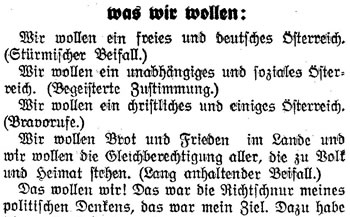
What we want
We want a free and Germanic Austria. (A storm of applause.)
We want an independent and social Austria. (Enthusiastic agreement.)
We want a Christian and unified Austria. (Shouts of 'Bravo'.)
We want bread and freedom in the country and we want the equality of everyone who stands for people and country. (long-lasting applause.)
That is what we want! That was the guide of my political thinking, that was my goal.
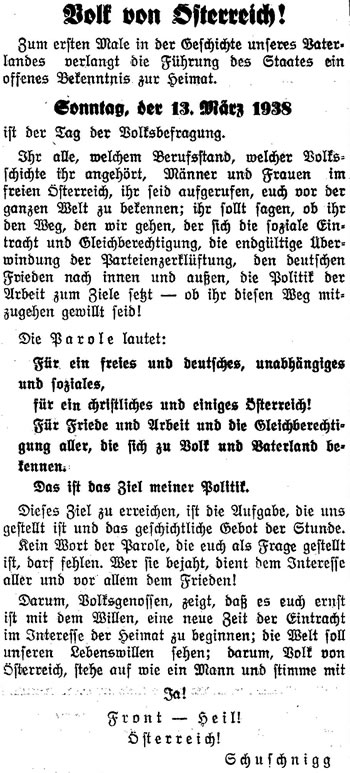
People of Austria!
For the first time in the history of our Fatherland the leaders of the state require an open affirmation to our country.
Sunday 13 March 1938
is the day of the referendum.
The referendem statement is:
For a free and Germanic, independent and social,
for a Christian and unified Austria!
For peace and work and the equality of all those who stand for people and Fatherland.
That is the goal of my politics.
To modern minds it is a mystery how any rational person could take Schuschnigg's rambling and incoherent statements as the basis for a referendum question, let alone be able to derive legitimacy from a vote on them.
But Schuschnigg was just another flavour of fascist, anti-democratic dictator who would prefere to run a one-party state. The main thing that differentiated him from all the other fascist, anti-democratic dictators of the time was his goal of an independent Austria.
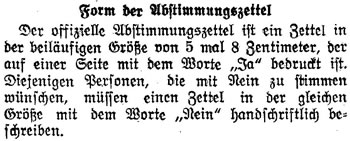
Form of the ballot paper
The official ballot paper is a sheet in the common size of five times eight centimetres, printed on one side with the word 'Yes'. Those people who wish to vote 'No' should use a paper of the same size with the word 'No' written on by hand.
Nothing like a free, unbiased election, is there? In these skewed voting rules, Schuschnigg betrays his authoritarian cast of mind.

Every decent Austrian will vote: 'Yes'.
Those not voting 'Yes' will presumably be a basket of deplorables.
Friday 11 March

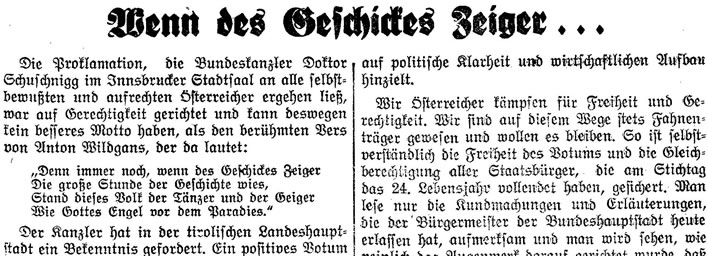
When the clock-hand of history …
When the leader writer has to resort to poetic quotations we know that desperation has set in. Perhaps they had an inkling of what was about to happen any moment, when the clock-hand of history 'points to the great hour' – the hour of an event much more epochal than a tinpot referendum.
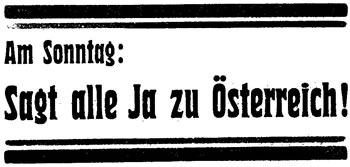
On Sunday: Everyone say 'yes' to Austria!

Enthusiastic meetings of support throughout Austria
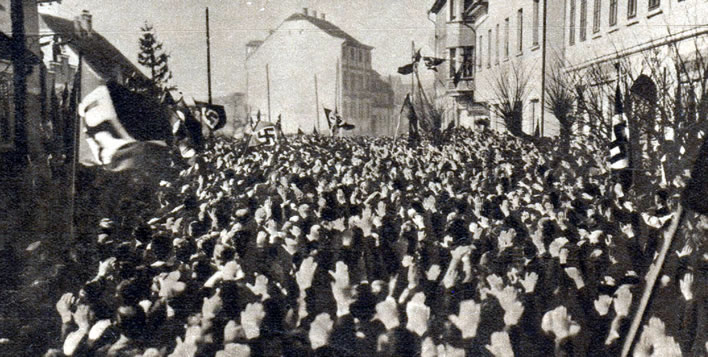
A 'spontaneous' demonstration in Oberwarth, in Burgenland, Austria, to protest against Schuschnigg's referendem.

The referendum without a negative statement
The last thrashings of a referendum in its death throes as the government twists and turns on problems of its execution:
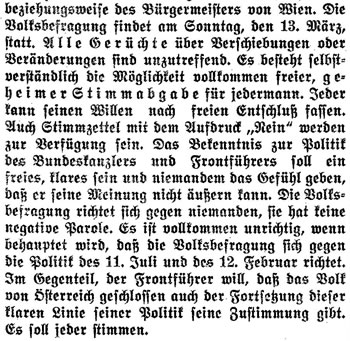
The intellectual capabilities of Schuschnigg and his ministers are being tested in the referendum planning and found extremely wanting.
We are now told that voting slips will be available pre-printed with 'No', so that voters do not have to bring their own sheet of paper. We wonder just how many of these 'No' votes will be available at each voting station.
The reason that there is no alternative on the ballot paper, we are now told, is that Schuschnigg's policy is not against anything in particular.
By that evening the referendum and all the political puzzlement around it were academic. Schuschnigg had been removed from power, as the readers of the Wiener Zeitung learned the following morning:
Saturday 12 March


The Federal President [Wilhelm Miklas] has charged Dr Seyss-Inquart with the running of government business.
It was clear that, for those who could read between the lines of the Wiener Zeitung, Schuschnigg's referendum plan had broken Hitler's patience. Some reports state that Hitler flew into a rage at the news of Schuschnigg's sleight-of-hand: Schuschnigg had to go and Austria had to be occupied.
President Miklas, after trying to find a minister to take the poisoned chalice of the leadership of Austria, finally appointed the Security Minister, Arthur Seyss-Inquart, a National Socialist to his fingertips.
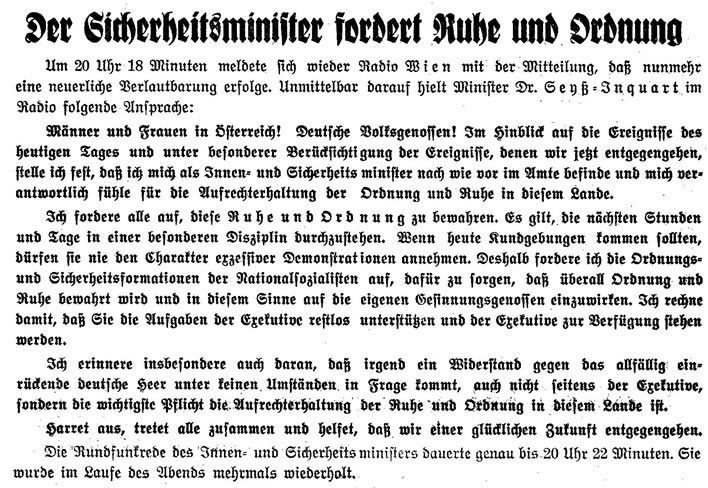
The Security Minister demands calm and order
At 20:18 Vienna Radio reported that a new proclamation would follow. Immediately afterwards the following speech by Minister Seyss-Inquart was broadcast:
Men and women in Austria! Comrades of the German people!…
I demand that everyone maintain calm and order. The next hours and days will require a particular discipline. Should demonstrations take place today, they must never take on an excessive character. I therefore require the order and security troops of the National Socialists to make sure that order and calm is maintained everywhere and in this sense also to control their own supporters. I rely on you to support the work of the executive and to make yourselves available to the executive.
I especially wish to remind you that there can be no question of any resistance against any German troops entering the country…
The radio speech of the Security Minister lasted until exactly 20:22. It was repeated several times during the course of the evening.
A four minute speech that marked the beginning of the German National Socialist takeover of Austria. The 'order and security troops of the National Socialists' meant the SA, the Sturmabteilung, the National Socialist thugs who were there to enforce compliance at street level.
By the time Austrians were reading this, German troops were entering their country.

Moving words of farewell from the Chancellor.
Kurt Schuschnigg was still nominally Federal Chancellor. He was forced to announce his own departure.

The Federal President has given me the task of announcing to the Austrian people that we are turning away from violence. We have, because we want at any price to avoid shedding German blood, given our army the order, that in the event of the entry of German troops there must be no appreciable resistence. Troops are to withdraw without resistence and await the decisions of the next hours. …
I thus depart in this moment from the Austrian people with a German word and a deeply felt wish:
God save Austria!
During the years of the war Kurt Schuschnigg was allowed to live, but he was shuffled between various imprisonments and concentration camps, with varying degrees of discomfort. He avoided execution and a possible show-trial. He was finally released by American troops in May 1945. He died a few months short of his hundredth birthday in Austria in 1977.
Sunday 13 March

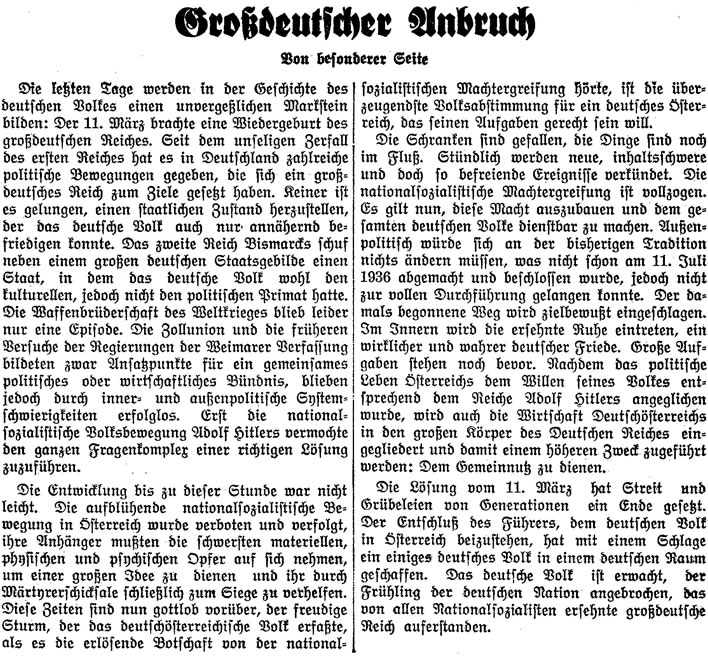
Dawn of the Greater Germany
The last few days will be an unforgettable monument in the history of the German people: The 11th March brought a rebirth of the Great German Empire. …
The recent developments to the moment were not easy. The blossoming National Socialist movement in Austria was banned and persecuted, its followers had to bear the severest financial, physical and psychological sacrifices in the service of a great idea, which through martyrdom they brought to victory. These days are over, praise God. The joyous storm that seized the German-Austrian people when they heard the redeeming news of the National Socialist seizure of power is the most convincing referendum for a German Austria, that will remain true to its duties. …
The solution of the eleventh of March has put an end to the discord and debate of generations. The decision of the Führer to assist the German people of Austria has created at a stroke a single German people in a German territory. The German people has awoken, the spring of the German nation has dawned, the Great German Empire longed for by all National Socialists has arisen.
In the hands of the National Socialist scriptwriters the language they use often develops messianic, pseudo-religious characteristics. The unification of the dispersed people, the arrival of a saviour, a messiah, and the resurrection of the German Empire and its people from the humiliations and ashes of their history – Hitler and Göbbels were masters of the prose of religious fervour. Ultimately, all of this is 'redeeming' news. Easter Day was on 17 April that year, but the political resurrection of Austria had come a month early.
The Austrians themselves, who had witnessed more than a century of the decay of their empire, were susceptible to this rhetoric, even if it was coming from the Prussian capital.
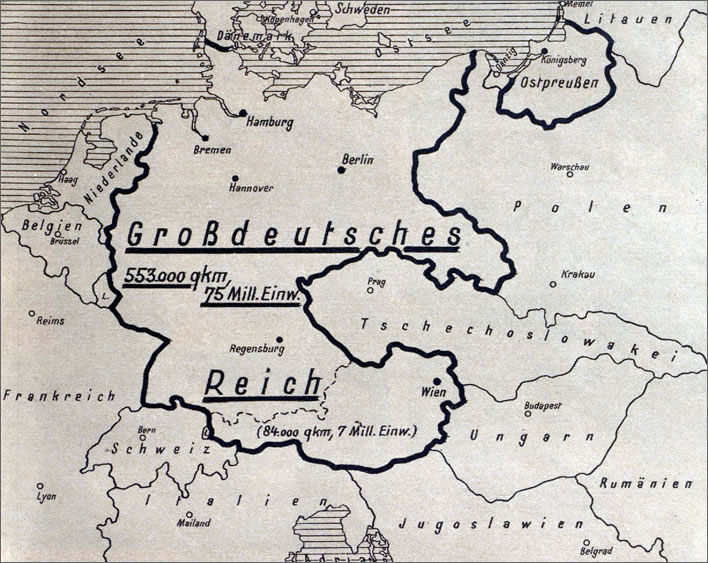
The new Grossdeutsches Reich formed as a consequence of the Austrian Anschluss.
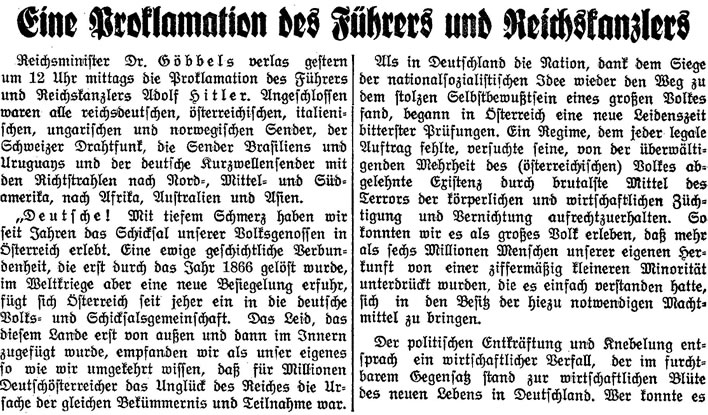
A Proclamation of the Führer and Imperial Chancellor
At noon yesterday Minister Dr. Göbbels read a proclamation of the Führer and Imperial Chancellor Adolf Hitler.…
Germans! With deep pain we have for years followed the fate of our Austrian people.… The political disempowerment and repression accorded with an economic decline that was in terrible contrast to the economic flowering of new life in Germany. …
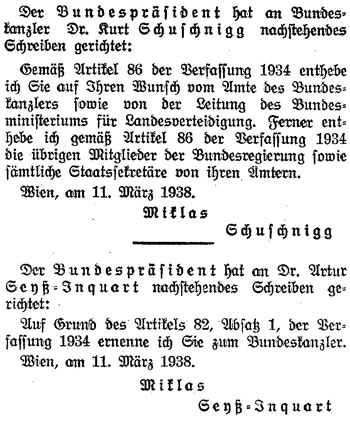
The Federal President Wilhelm Miklas dismisses Schuschnigg as Federal Chancellor. He appoints Seyss-Inquart as the new Chancellor.
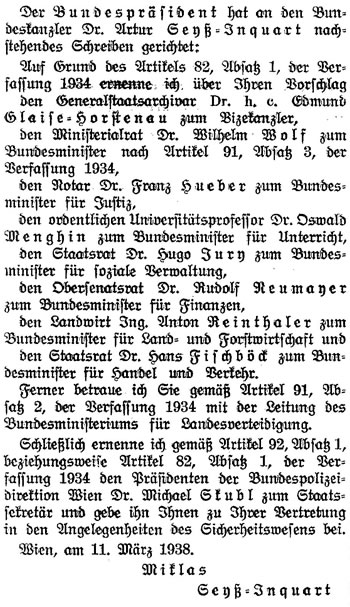
Seyss-Inquart immediately sets up his new cabinet – all good National Socialists.
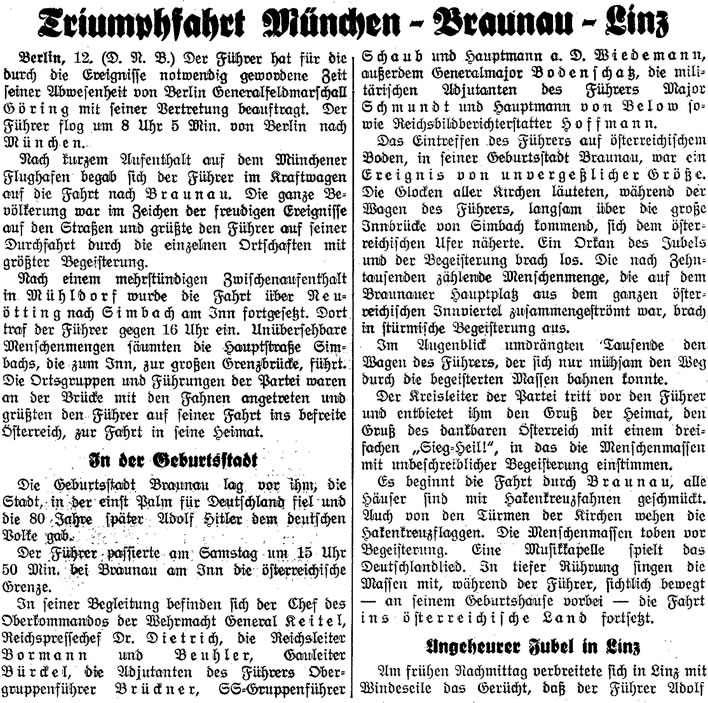
Triumphal journey Munich-Braunau-Linz
In the town of his birth.
A day of symbolism for Adolf Hitler – was any day not a day of symbolism for him, you might well ask. He flew from Berlin to Munich, than took a car to Braunau, his birthplace. The crowds and flags were mobilised as he crossed the bridge over the river Inn into Austria.
The arrival of the Führer on Austrian soil in his birthplace of Braunau was an event of incomparable greatness. The bells of all the churches rang out, whilst the Führer's car, coming slowly from Simbach over the large bridge over the Inn, neared the Austrian bank. A hurricane of jubilation and enthusiasm broke out. The crowd, around ten thousand people from throughout the Inn region, had gathered in the main square of Braunau and broke into rapturous enthusiasm. …
On the drive through Braunau, all the houses were decorated with swastikas. Swastika flags even waved on the steeples of the churches. The crowds went wild with enthusiasm. A band played the Deutschlandlied. Moved deeply, the crowds sang along, while the Führer, visible moved – driving past the house of his birth – continued with his journey into Austria.
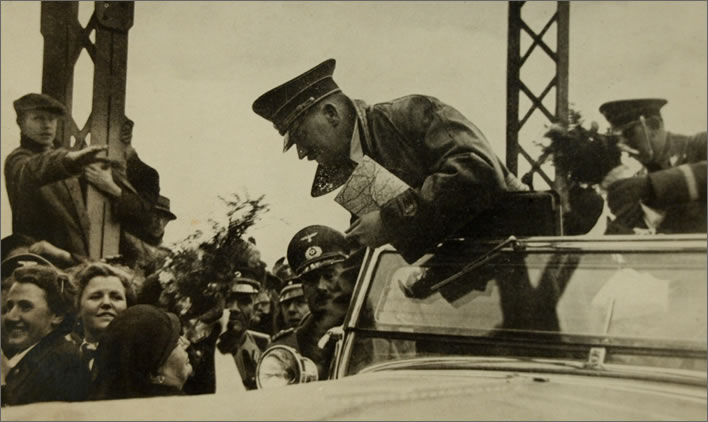
Hitler's convoy crossing the bridge over the Inn towards Braunau on 12 March 1938. Image: Wikimedia.
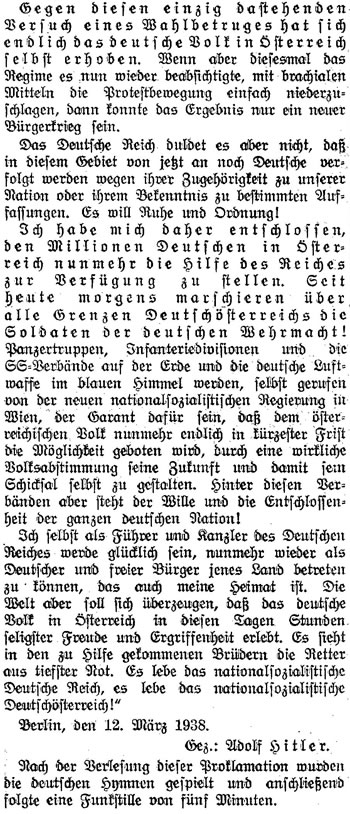
In Berlin, whilst Hitler was on his way to Braunau, Göbbels read out Hitler's proclamation of the Austrian Anschluss– a 'joining up' of things that belong together, as a plug in a socket.
We are told that Schuschnigg's referendum would have been an 'electoral swindle', which, had it gone ahead and the Schuschnigg government had continued with its represssion, the only outcome would have been civil war. The German Empire, however, 'cannot tolerate the persecution of Germans on account of their belonging to our nation'.
I have therefore decided to make the assistance of the Reich available to the millions of Germans in Austria. Since this morning the soldiers of the German army march across all the borders of German Austria!
On the ground tank convoys, infantry divisions and the SS-companies, in the blue skies the German airforce, called by the National Socialist government in Vienna itself, are the guarantee that the Austrian people will be given the opportunity in a real referendum to determine their future and their destiny by themselves. Behind these troops however stand the will and the unity of the entire German nation!
I, myself, as Führer and Chancellor of the German Empire, will be happy once again as a German and free citizen to be able to tread the soil of my home country.
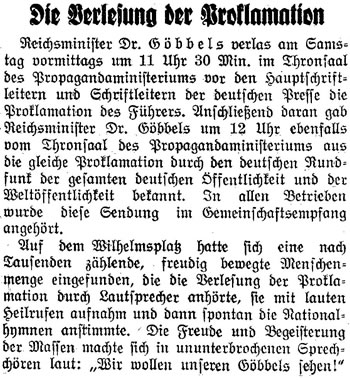
The reading of the proclamation
Göbbels read the proclamation in the Propaganda ministry to the Press. It was also broadcast through loudspeakers to the joyous crowds in the Wilhelmsplatz and then read once again on the radio.
The joy and enthusiasm of the masses was loudly expressed in endless chanting: 'We want to see our Göbbels!'
No translator can help the English-speaking reader with the shifting sands of the National Socialist terminology around the Anschluss. Sometimes the Austrians are 'Germans' or 'German Austrians' or 'Austrian Germans'. Their army is the 'Austrian German Army' or the 'German Austrian Army' according to taste. As we shall soon see, only a few days after the Anschluss Austria had ceased to exist and the Austrians were all strictly speaking simply 'Germans'. At least during the early months of the Anschluss the occupiers showed some sensitivity to the patriotic feelings of the occupied.
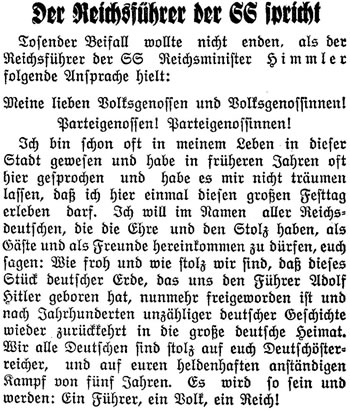
After visiting Braunau, the Hitler convoy arrived in Linz, a good opportunity for a bit of parading and speechmaking.
It was not an accident that Hitler had involved the SS deeply in the takeover of Austria. They were, after all, the specialists in bringing unruly populations to order. They took charge of the reorganization of the police in Austria.
Heinrich Himmler, the leader of the SS, gave an short and anodyne speech to the crowd in Linz – no one ever dared upstage a Hitler speech, in length or in content. Nevertheless, Himmler received 'raging applause' for his piece, ending:
We Germans are all proud of you German Austrians, and of your heroic, respectful fight over five years. It will be so and will become so: One Führer, one people, one Reich!
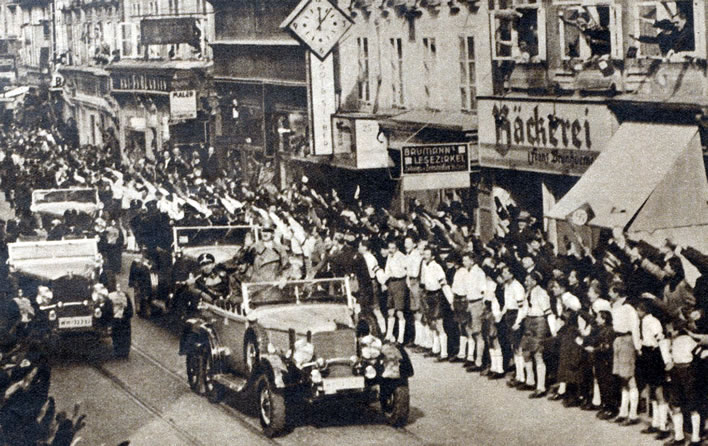
Hitler arriving in Linz. We are told that 60,000 people turned out to greet him.
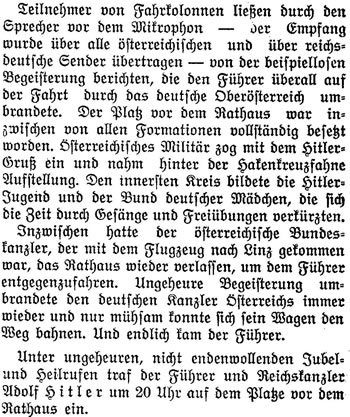
The event at the Linz town hall was broadcast over all German and Austrian radio stations. Some of the members of the army formations described in radio interviews the enormous enthusiasm of the crowds that had turned out to welcome the Führer during the drive through Upper Austria to Linz.
The square in front of the Town Hall was soon fully occupied by all the military formations. The Austrian military arrived with the Hitler salute and took their positions behind the Swastika. The inner circle was made up of the Hitler Youth and the League of German Girls, who entertained themselves with songs and gymnastic exercises. …
Under gigantic jubilation and shouts of 'Heil', the Führer and Reichs-Chancellor Adolf Hitler entered the square at 20:00.

The Federal Chancellor [Seyss-Inquart] greets the Führer
The usual stuff.
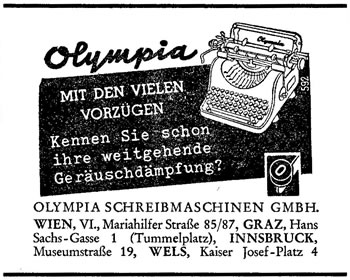
At such moments of historical uncertainty only one thing is sure: there is going to be a lot of paperwork in the newly expanded German Empire, when Prussian administrative typing meets Austrian administrative typing. The Austrian typewriter manufacturer Olympia gets its advertising in promptly. Business is business!

Fiery speech by the Führer
Hitler's speech ticked all the boxes in the manual of Nazi speechmaking. All political and legal arguments are trumped by the 'will of the people' and the Vorsehung.
The 'will of the people' is a development from that useful idiot Jean-Jacques Rousseau, via the head-hacking savages of the French Revolution. Disencumbered of its French origins and spiced up with misunderstood Schopenhauer and Nietsche it is now ready to serve National Socialist tyrants as a phrase of validation for anything they choose to do.
Vorsehung, 'providence', 'destiny' or 'fate' is a quasi-religious destiny that watched over Hitler and the German people. It belongs in the psychological armoury of the religious fanatic and the gambler.
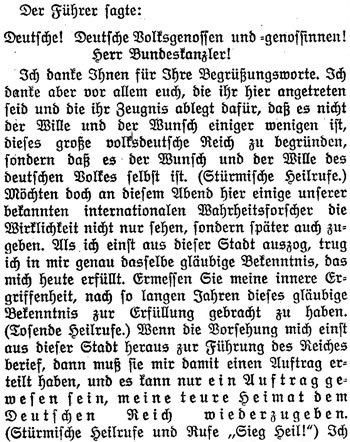
I thank above all you who have turned out here today. Your numbers have given the evidence that the foundation of this Great German Empire is not just the will and the desire of a few people but that it is the desire and the will of the German people itself. (A storm of shouts of 'Heil'.) …
Picking up on his visit to his birthplace in Braunau earlier that day, Hitler now draws a circle of predestination from his birth to this moment of the creation of the Great German Empire.
When I left this town I carried in me the same credo that fills me today. Imagine my innermost feelings, after so many years to have been able to fulfil this credo. (Wild shouts of 'Heil') If Providence has called me out of this town to the leadership of the Empire, then it must have given me a task to do, and it can only be the task of giving my dear homeland back to the German Empire once more. (A storm of shouts of 'Heil' and calls of 'Sieg Heil'!)
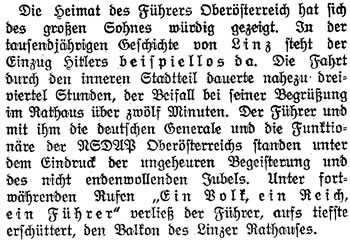
'Upper Austria, the homeland of the Führer, has shown itself to be worthy of its great son', concluded the Wiener Zeitung.
The drive through the town centre took nearly three-quarters of an hour, the applause at his reception in the Town Hall more than twelve minutes. …
Among continuing shouts of 'One people, one Empire, one Führer' the Führer, deeply moved, left the balcony of Linz Town Hall.
A brief aside may throw some light on the personal significance for Adolf Hitler of his triumphant return to Austria. The country was now at his feet. The decision to carry out the Anschluss had been almost entirely his.
Stefan Zweig, the Austrian writer – a Jew – who saw the writing on the wall and left Austria in good time in 1934, always maintained that the Anschluss was Adolf Hitler's revenge on the country that had spurned him. Zweig, a friend of Sigmund Freud, liked to take the psychoanalytic view of historical characters.
Who knows what was going on in Hitler's head? He kept no diary, he was a man without soulmates and of the few who were even half close to him, none lived to talk. Hitler's personal motivation in carrying out the Anschluss is now inscrutable – it doesn't really matter, either.
With the Anschluss Hitler increased his renown, his reputation for infallibility as a lucky opportunist. The important mythological component of the Third Reich was also given a boost: another date with destiny fulfilled. The great theme of all the speeches was the idea of the Great German Empire. Before the Anschluss the word 'empire' had a technical meaning that was largely hollowed out. When Austria was appropriated the Third Empire really did become an empire.
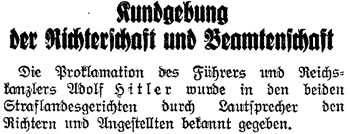
Demonstration of judges and civil servants
Piece by piece, the elements of the civil society were aligned with their new National Socialist rulers.
The judges and the civil servants were gathered together and had Hitler's proclamation read to them. There were no contradictions, only noisy acclamations of agreement.
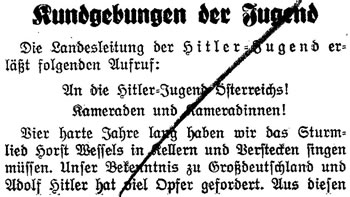
Announcement of the [Hitler] Youth
The nurseries of the National Socialists were brought into line for the new situation.
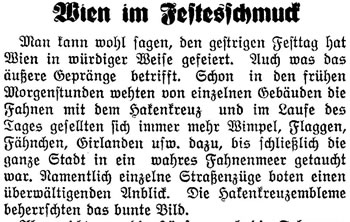
Vienna in festive decoration
The masses were also mobilised. Who would dare not to hang a swastika on their house?
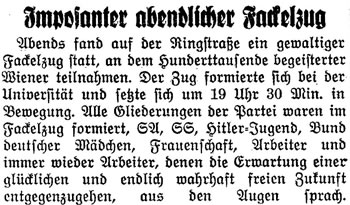
Imposing evening torchlight procession
In the evening a gigantic torchlight procession was held on the Ringstrasse, in which a hundred-thousand enthusiastic Viennese took part. The procession began at the university at 19:30. All the elements of the party were represented in the procession: SA, SS, Hitler-Youth, League of German Girls, Women's Group, workers and ever more workers, out of whose eyes the expectation of a really free future shone.
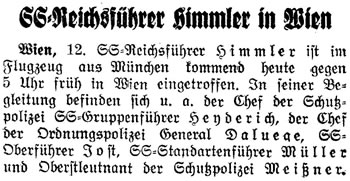
SS-Reichsführer Himmler in Vienna
Himmler, Heydrich and an assorted gang of police high-ups arrived in Vienna from Munich by plane at five-o'clock in the morning. They were there to organize the Austrian police to ensure that, should there be less-enthusistic Austrians (such as the Communists), they would have no chance at all to cause trouble.
The Wiener Zeitung tells us of the ecstasy of the Austrians at the German takeover. It leaves out the considerable sacrifices of opposition elements. As the arrival of the beautiful people of the SS and police suggests, the public and political life of Austria, especially in Vienna, was ruthlessly cleansed of all potentially subversive elements. The SS were placed in charge of the police forces in Austria and a period of brutal suppression of dissent – real, imagined or merely potential – was introduced. It is estimated that around 70,000 Austrians were rounded up during the first few days of the action alone.
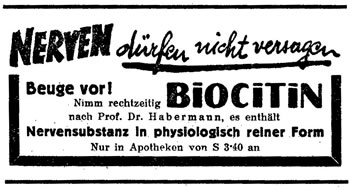
As already noted, the few advertisments that appeared in the Wiener Zeitung wasted no opportunity in those exciting times.
NERVES must not fail
Prevent! Take BIOCITIN in good time…
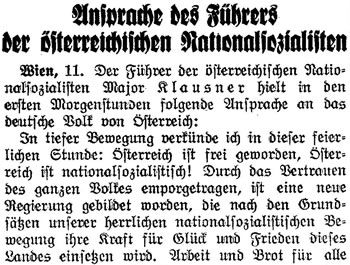
Speech by the leader of the Austrian National Socialists
Austria has become free, Austria is National Socialist!
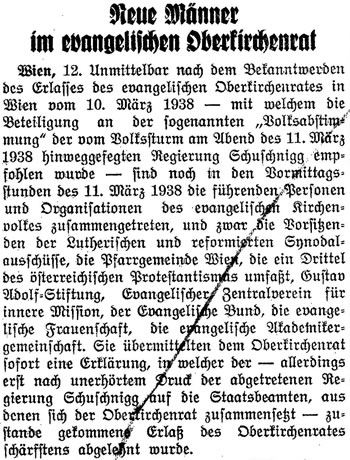
New men in the Protestant Church Council
The Austrian churches rolled over in the face of inevitability just as quickly as their German counterparts had done in 1933.
Here a minor embarrassment is disposed of: on 10 March the Church Council had recommended a vote of YES in Schuschnigg's referendum. Now, two days later they sharply reject that recommendation, which had come about 'only through the exceptional of the pressure from the Schuschnigg government and the civil servants who were members of the Council'. Out with the old, in with the new – what a difference a day makes.

From Scharnitz to the Brenner
On 12 March the German Army rolled across Austria without the slightest hindrance, accompanied by the jubilation of the populace.
The sheer immensity of the German army rolling over their borders would certainly have impressed any onlookers. Osama bin Laden's saying comes to mind:'Given a choice between the weak horse and the strong horse, people always choose the strong horse'. For Austrians, facing that wall of grey armour and grey uniforms, the choice largely made itself.
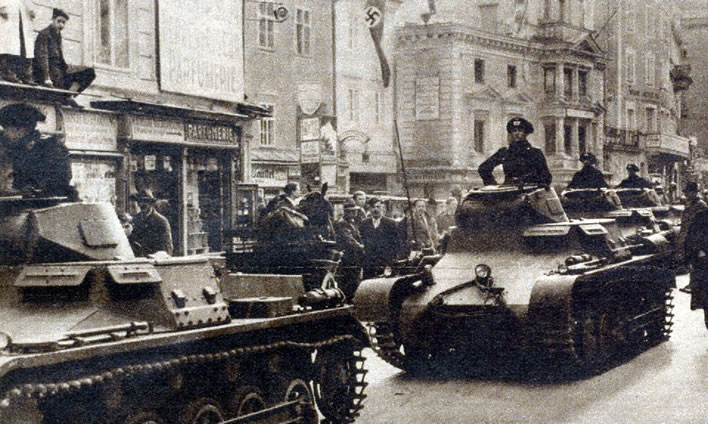
German armoured vehicles arriving in Salzburg to general public acclamation.
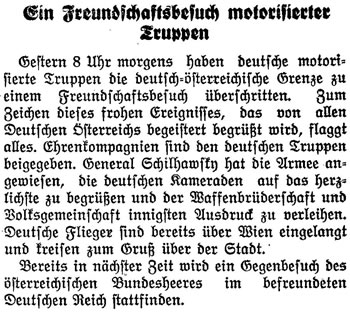
The friendship visit of motorised troops
Yesterday at eight o'clock in the morning the motorised German troops crossed the German-Austrian border for a friendship visit. As a sign of this joyful event, an event which is being greeted with enthusiasm by all German Austrians, there were flags everywhere. Guards of honour accompanied the German troops. General [Sigismund] Schilhawsky had ordered the army to greet its German colleagues warmly and express sincerely the brotherhood of arms and the community of the peoples. German aircraft have already reached Vienna and circle overhead to greet the city.
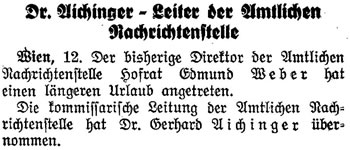
Dr Aichinger – Head of the official press agency
All change in the manipulation of official news. The previous Director 'has started a long holiday'.

In the homeland of the Führer
In Linz, the provincial capital of Upper Austria, it was midnight before the gigantic demonstration finished. The figure for the number of demonstrators at 50,000 is probably an underestimate. Here, too, the movement of the united German people has taken over public power. All public buildings and offices are occupied by National Socialists. Huge swastikas wave from Linz Town Hall. Everywhere there is calm and order.
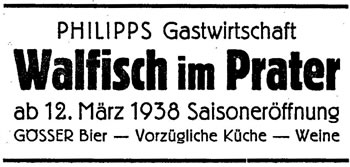
The restaurant Walfisch, 'Whale', in the famous Prater amusement park goes fishing for all the new German customers now in Vienna. The season conveniently opened on 12 March.
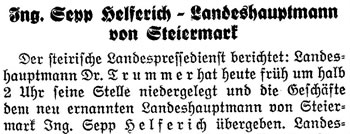
Ing. Sepp Helferich – Chief of Styria Province
'Dr Trummer resigned at one-thirty this morning'. The members of the old guard in the provinces are unceremoniously swept away one by one.
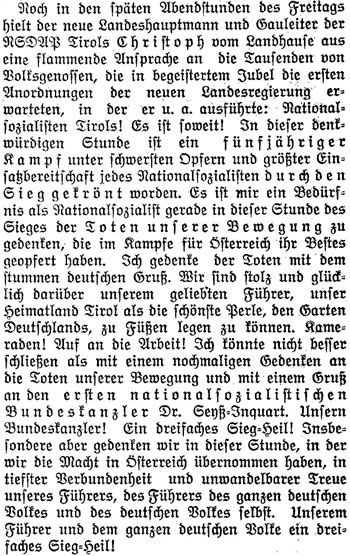
In Tyrol a new Chief of the Province took over late on Friday 11 March. He gave a speech with many references to the sacrifices made by National Socialists in the previous five years.
… a greeting to the first National Socialist Federal Chancellor, Dr Seyss-Inquart. Our Federal Chancellor! A triple Sieg-Heil ! But at this moment, in which we have taken over power in Austria, in deep solidarity and immutable loyalty we think of our Führer, the Führer of the entire German people and the German people itself. To our Führer and the entire German people a triple Sieg-Heil!
Monday 14 March


The Federal Constitutional Law over the Reunification of Austria with the German Reich
Three days after the start of the Anschluss, the constitutional changes were announced. The had been signed into law the previous day in Linz by Hitler and Seyss-Inquart.
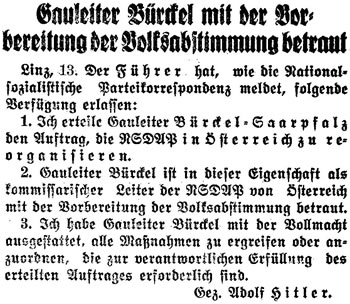
Gauleiter Bürckel charged with the preparation of the referendum
In order to gain even more legitimacy for the annexation of Austria, Hitler wanted to hold a referendum. Unlike Schuschnigg's hasty effort, this would take place in a month on the 10 April. Hitler put Josef Bürckel in charge of the reorganization of the party and with the preparations for the referendum.
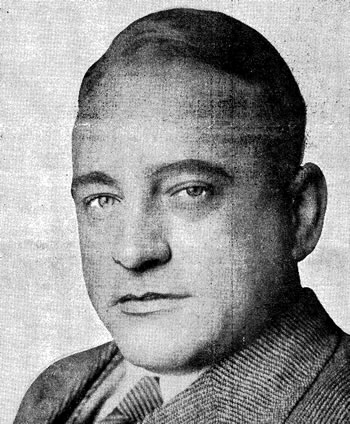
Josef Bürckel. Image Wiener Zeitung, 25.03.1938.
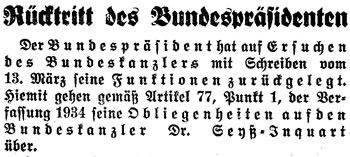
Resignation of the Federal President
The Federal President resigned and handed over his powers to the Federal Chancellor Seyss-Inquart.
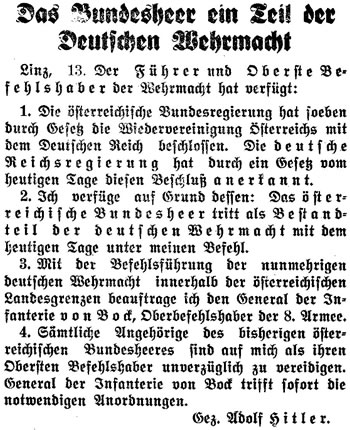
The Austrian Army a part of the German Army
Hitler put Infantry General von Bock from the Eighth Army in charge of the unified troops within the Austrian border. The military execution of the German invasion of Austria had been carried out by Bock.

Changes in the Federal Government
The ministerial levels of the Austrian government were purged.

Ambassadors relieved of their posts
After the acceptance of the new constitution Austria ceased to exist as a political entity. Its ambassadors in London, Paris and Prague were relieved of their duties with immediate effect.
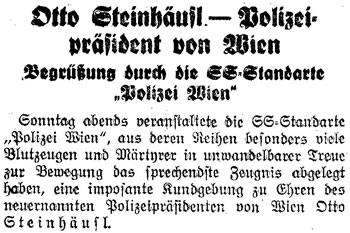
Otto Steinhäufl – Police President of Vienna
Greeting by the SS troop 'Vienna Police'
Yet another evening parade in Vienna.
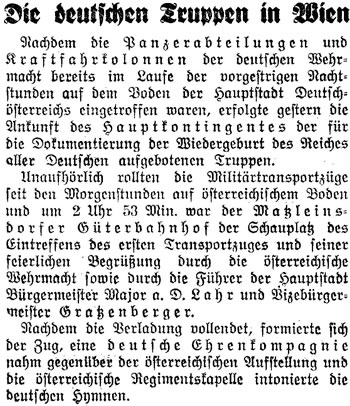
The German troops in Vienna
The tanks and motorised divisions of the German army had arrived on Austrian soil on 12 March. Now it was the turn of the remaining units to arrive in Vienna, the 'capital of German Austria'. Austrian troops were present to give them a good welcome.
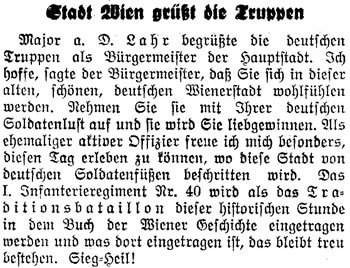
The city of Vienna greets the troops
The mayor of Vienna welcomes them in an act of grovelling submission:
…As a former active officer I am especially happy to experience this moment, when this city is walked upon by the feet of German soldiers.
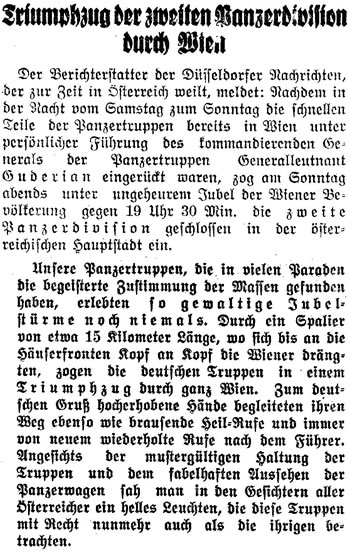
Triumphant parade of the Second Tank Division through Vienna
The tanks pass along about 15 km of road lines with cheering and saluting Austrians.
In the face of the exemplary behaviour of the troops and the fabulous appearance of the tanks a bright expression was to be seen in the faces of all the Austrians, who were now able to call these troops their own.
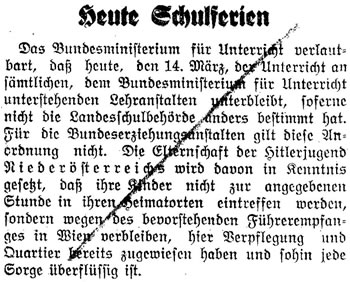
School holiday today
Children are needed for flag-waving duties.
Parents of the children in the Hitler Youth for Lower Austria have been informed that their children will not return to their homes but will, on account of the reception for the Führer in Vienna, remain in Vienna. Food and lodging have already been assigned and so there is no reason to worry.
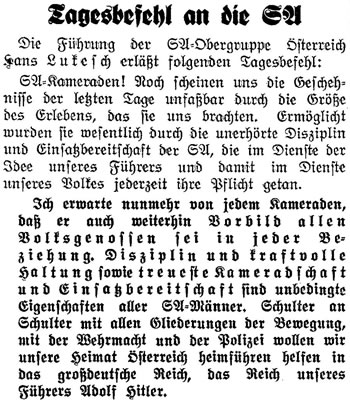
Special order to the SA
When the world is watching it is necessary to make sure that you keep your thuggish gangs well under control.
I expect from every comrade that he will continue to be a model for others in every respect. Discipline and powerful conduct as well as loyal comradeship and readiness must be the characteristics of all SA men.
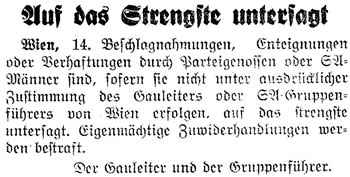
Strictly forbidden
It appears that some party and SA members have been getting out of hand:
Confiscations, appropriations or arrests by party members or SA men, unless they are explicitly ordered by the Gauleiter or the SA Group Commander in Vienna are strictly forbidden. Violations will be punished.
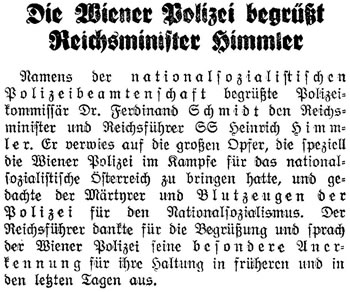
The Viennese Police welcome Reichsminister Himmler
Himmler praises the police for their sacrifices in the 'fight for the National Socialist Austria'.
The Wiener Zeitung is struggling to keep up with events and present them in an orderly way. The normally rational division of its content that served so well in normal times – Austria / Vienna / Provinces / Sport etc. – no longer makes sense in the general confusion of the German takeover.
For our embattled readers, probably tearing just as much hair out in frustration as the readers of the Wiener Zeitung were doing in 1938, here is a brief overview of events so far:
12 March
- 04:30 Himmler and a planeload of SS and police arrive at Aspern airport in Vienna.
- 08:05 Hitler leaves Berlin by plane.
- Lands at Munich airport, changes to a car with a large escort.
- 15:50 crosses the Austrian border at Braunau, his birthplace.
- Driven to Linz. Seyss-Inquart and Himmler arrive in Linz by car around 17:00, then go out to meet Hitler on his way in.
- 20:00 Hitler's speech from the balcony of Linz Town Hall. Stays overnight in the Hotel Weinzinger.
- Whilst Hitler is in Linz the security forces under Himmler begin rounding up the usual suspects. All opposition will be surpressed before Hitler makes his appearance in Vienna.
13 March
- Meetings in Linz.
- 12:00 Hitler is driven the 15 minutes from Linz to Leonding, to visit his parents' grave.
- 12:30 Hitler is driven back to Linz.
- 14:30 lunch, meetings and visits to Hitler's old haunts. Many of Hitler's initial appointments were made on this day. Hitler and Seyss-Inquart signed the Gesetz über die Wiedervereinigung Österreichs mit dem Deutschen Reich, the formal beginning of theAnschluss.
- 17:00 Military parade and fly-past in Linz.
- Dinner for selected Austrian National Socialists. Stays overnight in the Hotel Weinzinger.
14 March
- Vienna has now been secured and Hitler is driven there, arriving in the afternoon. By that time nearly all of Austria has been secured for the National Socialists.
- 19:15 Hitler's speech in Vienna.
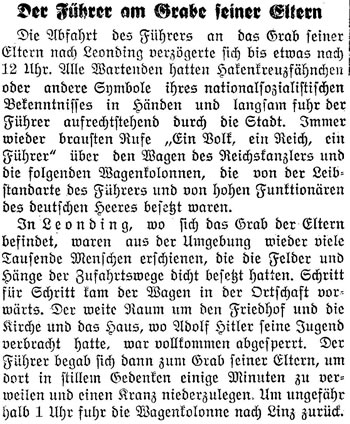
Around noon on 13 March Hitler is driven to Leonding, a village just outside Linz, to visit the grave of his parents. Crowds line the route. After a few minutes of silent contemplation he lays a wreath. He leaves at 12:30 to return to Linz.
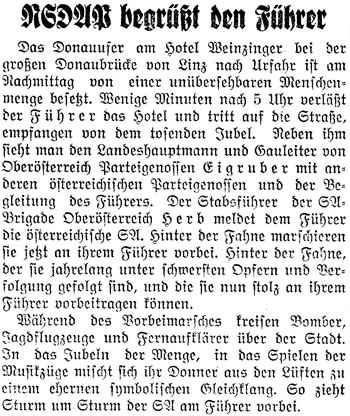
Five o'clock in the afternoon. A huge crowd has collected in front of the Hotel Weinzinger. Hitler leaves the hotel to take the parade of the Austrian SA. The parade is accompanied by a fly-past of bombers and fighter planes over Linz.
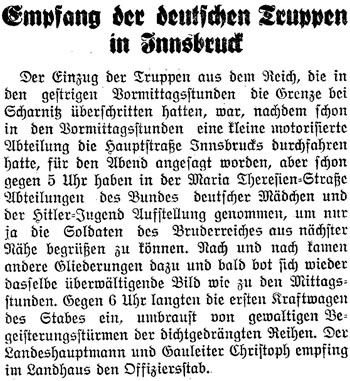
Reception of the German troops in Innsbruck
Innsbruck, the capital of the Tyrol, gets the 'we are the masters now' treatment:
… By around five o'clock in the afternoon, groups of the League of German Girls and the Hitler Youth had already taken their places in the Maria-Theresia-Strasse, in order to greet the soldiers of the brother-Reich at close hand. … At around six o'clock the first staff vehicles arrived, in the middle of powerful waves of enthusiasm from the closely-packed specators.
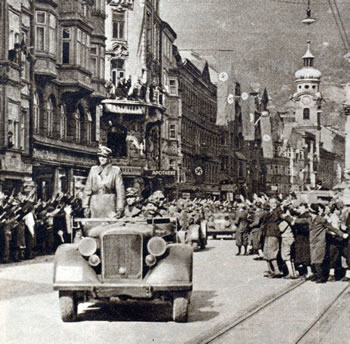
German troops arriving in Innsbruck in the Tyrol, greeted by enthusiastic crowds.
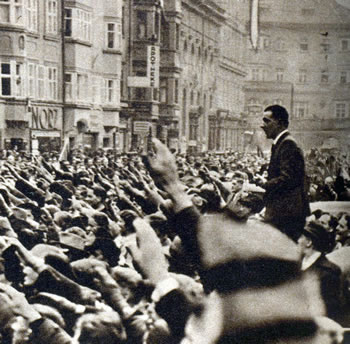
Public elation in Innsbruck The man standing is the new Bürgemeister.
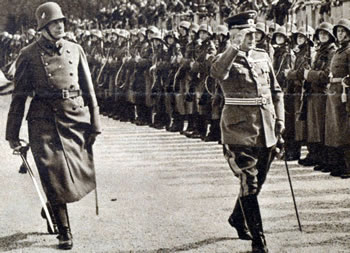
The first battalion of the legendary Tyrolean Kaiser-Jägerregiment are reviewed by General Prager in Innsbruck. We wonder what Schubert's acerbic friend, Johann Senn, who served in the regiment for eight years, would think of such Tyrolean subservience.
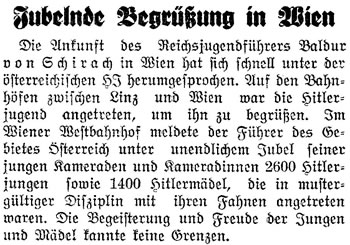
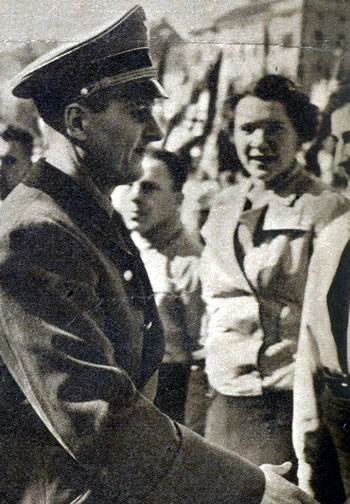
The Head of the Hitler Youth greeting his charges on the Heldenplatz in Vienna.
Joyous greetings in Vienna
Baldur von Schirach, the Reichsjugendführer, gets the treatment on his arrival in Vienna to speak to the Austrian Hitler Youth. Groups of girls and boys were lined up on the stations between Linz and Vienna. He gave a speech on arrival at the station to 2,600 Hitler Youth and 1,400 Hitler Girls, whose 'enthusiasm and joy knew no bounds'.
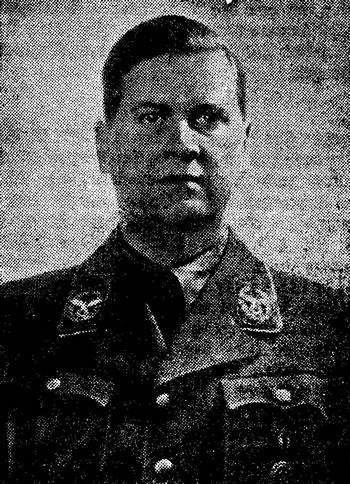
Baldur von Schirach. Image: Wiener Zeitung 6 April 1938.

One people, one Reich, one Hitler-Youth
The youth of Austria swears faithfulness to the Reich
In the Heldenplatz in Vienna the Hitler Youth organized a mass-demonstration, with a speech by Baldur von Schirach, the Reichsjugendführer.

Comrades of the Gymnastic and Sport associations
'Overflowing joy fills us!'
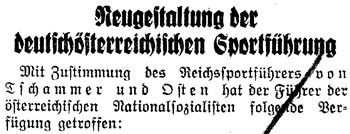
Reorganization of the leadership of the German Austrian Sport management
The 'Führer of the Austrian National Socialists' cleans out the stable, a process that was happening in every club and society in Austria.

The swastika symbol is reserved for the use of German people
A mysterious report that swastika and the National Socialist party badge may only be displayed by Germans (which category now incudes Austrians). 'Other races who display the swastika can expect unpleasant consequences'.
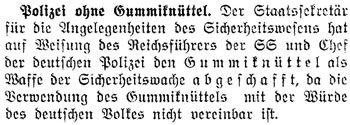
Police without rubber truncheons
The use of the rubber truncheon by the police is 'incompatible with the dignity of the German people'.
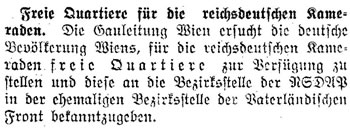
Free billeting for German comrades
The Viennese are now expected to offer free accommodatiion to German troops and should report its availability to the party office.
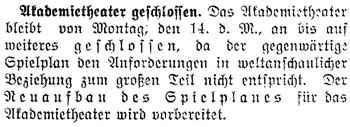
Academy Theatre closed
Closed down from Monday 14 March until further notice. The 'current repertoire does not meet the ideological demands in large measure'.

The Führer is coming to Vienna
From 12 noon general shutdown
After his triumphant appearance in Linz, Hitler left there on the morning of the 14 March and headed to Vienna for the big demonstration.
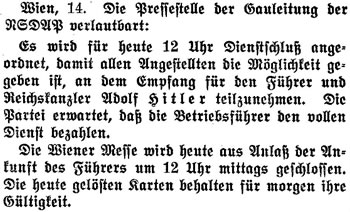
Drumming up the participants for the coming demonstration. Staying away is not an option.
A closure [of businesses and offices] has been ordered for 12 noon today, so that all employees have the opportunity to take part in the reception of the Führer and Reichskanzler Adolf Hitler. The [National Socialist] party expects employers to pay employees their full wages.
Tuesday 15 March
Unfortunately the first two pages of this issue are missing in ANNO.

Today at 11 o'clock Gigantic demonstration on the Heldenplatz, at 2 o'clock Heroes' Remembrance and parade of the troops in front of the Führer.

Hours of ovations for the Führer
Hitler arrived in Vienna on Monday 14 March, where he stayed at the Hotel Imperial.
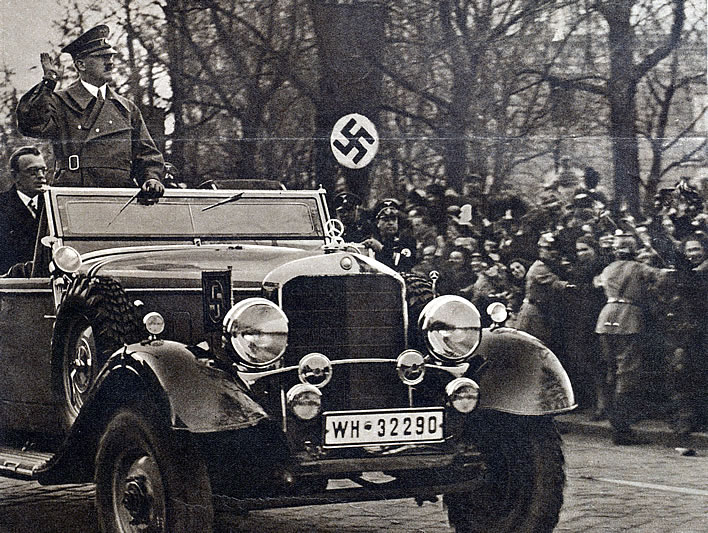
Hitler's arrival in Vienna. His poodle, Arthur Seyss-Inquart has taken a back seat.
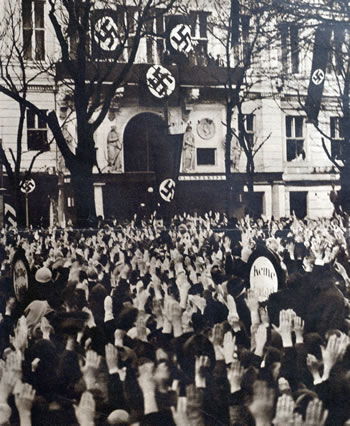
Hitler on the balcony of the Hotel Imperial in Vienna. The hotel was surrounded for hours by a mass of people chanting the usual slogans. Hitler showed himself on the balcony of the hotel six times during this period.
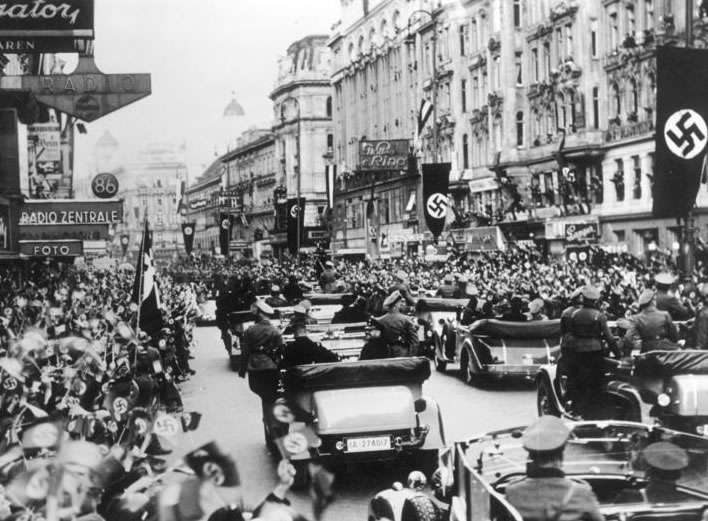
Hitler's triumphal arrival procession in Vienna on the afternoon of 14 March 1938. Image: Bundesarchiv.
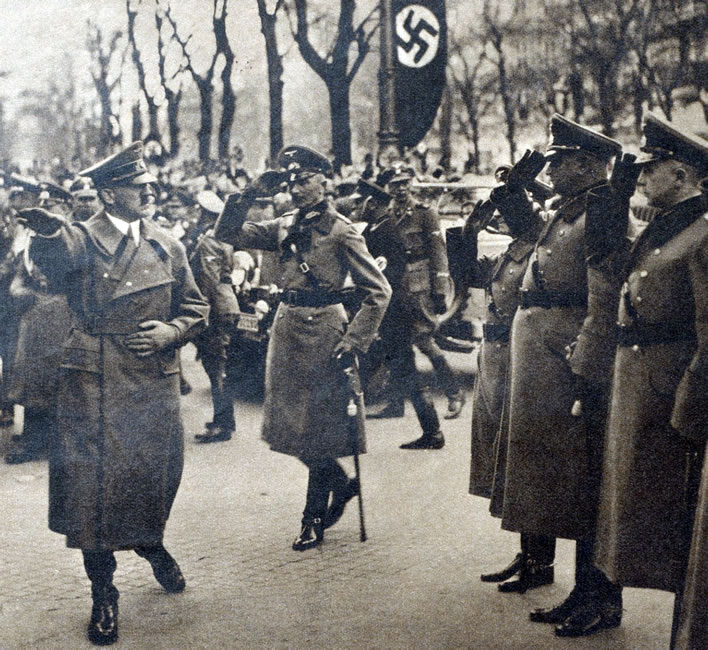
Hitler greeted by some of his generals on his arrival at the Hotel Imperial in Vienna. The peculiar walk results from trying to walk with an arm extended and is aggravated by looking sideways whilst doing so. Try it yourselves – just don't let anyone see you doing it: we live in dangerous times.
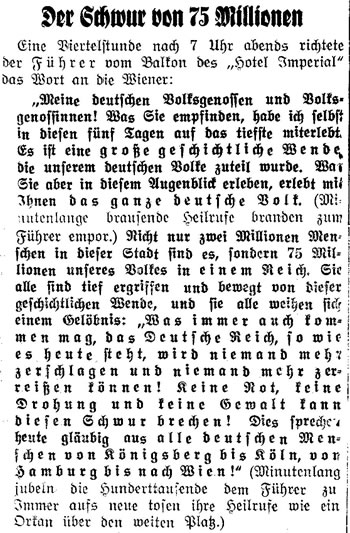
The oath of 75 million
At seven-fifteen that evening Hitler appeared on the balcony of the hotel and delivered a speech to the crowd.
Not only the two million people in this city, but seventy-five million of our people in a single Reich. They are all deeply moved by this historical change and they all make this vow: 'Whatever might happen, the German Empire, as it today is, will never be able to be broken up by anyone or ripped apart by anyone. No desperation, no threat and no force can break this oath. This is today spoken with conviction by all German people, from Koenigsberg to Cologne, from Hamburg to Vienna!'
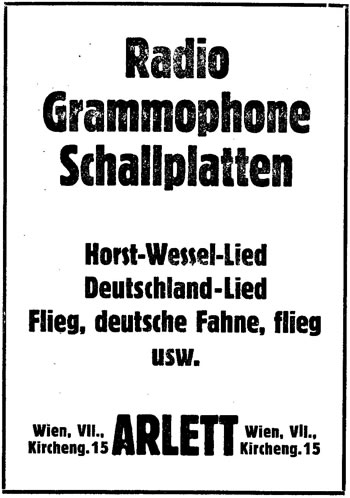
The business people of Vienna are taking the opportunities offered by the Anschluss:
Radio / Grammophone / Records
Horst-Wessel-Lied / Deutschland-Lied / Fly, German flag, fly / etc.

Munich receives Austrian soldiers with brotherly enthusiasm
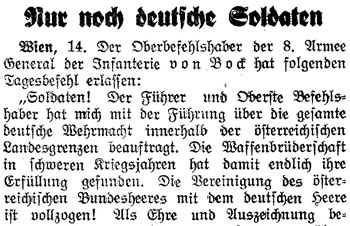
Now only German soldiers
Hitler has given infantry General Bock command of all the military forces within Austria.
The brotherhood in arms in the difficult war years has thus found its completion. The union of the Austrian Army with the German Army has been completed!
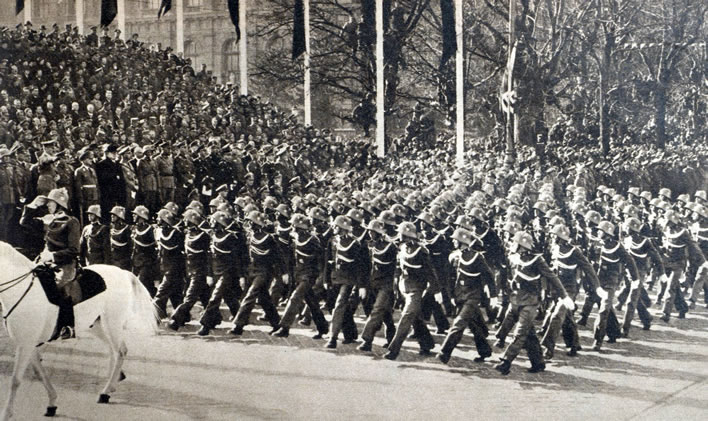
The (previously Austrian) Regiment of the Imperial Guard marches past Hitler's tribune.
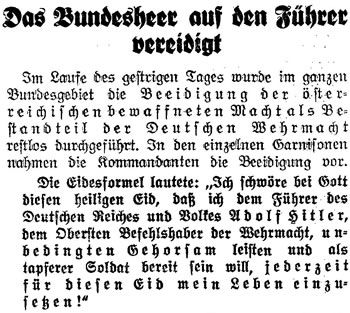
The Austrian Army swears the oath to the Führer
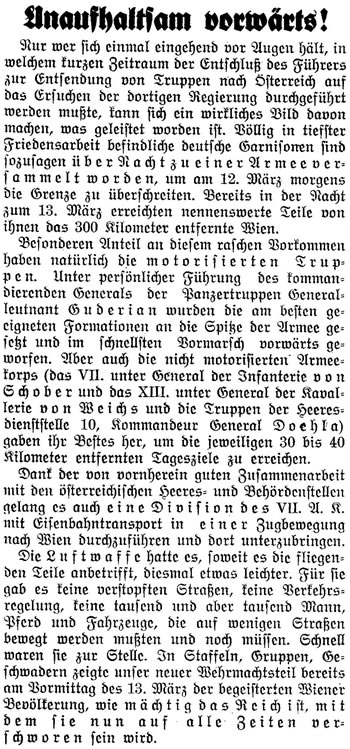
Irresistably forwards
The German garrisons were completely occupied with peaceful tasks when over night, so to speak, they were brought together as an army in order to cross the border on 12 March. Already in the night to 13 March appreciable numbers had reached Vienna, 300 km away.…
Thanks to the good cooperation with the Austrian Army and authorities it was possible to transport a division by train to Vienna and accommodate them there.
[The Air Force] were already able in the morning of 13 March to display our new fighting force to the delighted population of Vienna, showing how powerful the Reich is, with which they are now bound by oath forever.
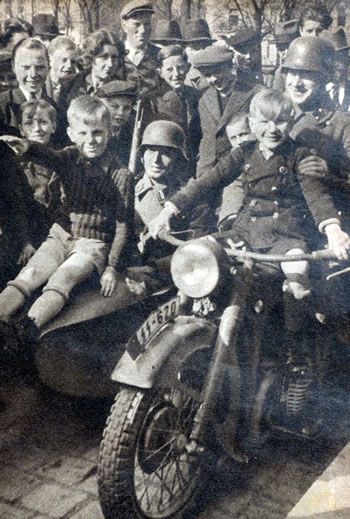
Hearts and minds. The German troops in Vienna let the local urchins ride on their motorbikes.
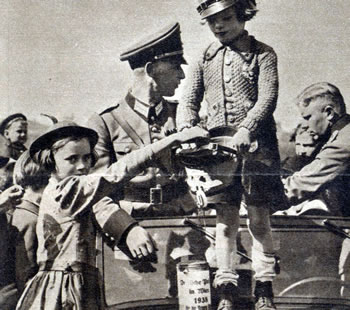
Hearts and minds. Children collecting for the German soup kitchens in Vienna.

Without rest by day and night

The entire operation has proved once more how proud we can be of our Army and how much we can rely on them. The Führer has an instrument of power in his hand, with we he can now really pursue a policy of the final pacification of Europe.

Changes in the provinces
Almost in the very first phase of the Anschluss sweeping change was effected in the governments and administrations in all the Austrian provinces. This was all done within the first few days of the Anschluss.
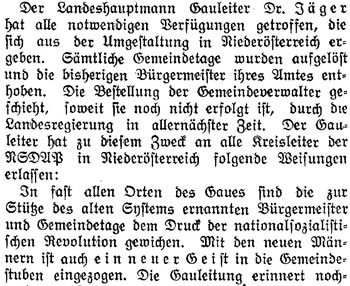
The example of Lower Austria:
All local councils have been dissoved and the existing mayors stripped of their office. The new administrators will be announced in due course. …
In almost every town in the province the mayors and councils of the old system have been set aside by the National Socialist revolution. With the new men a new spirit has entered the council offices.
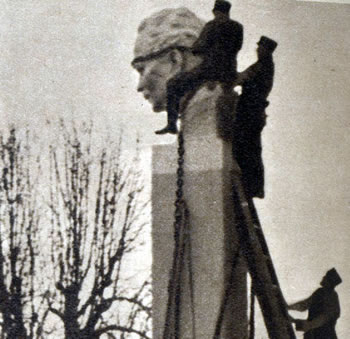
Pulling down the memorial to the previous Federal Chancellor (1932-1934) Engelbert Dollfuß in Graz. Dollfuß was murdered during the unsuccessful putsch attempt by the Austrian National Socialists in 1934. The statue had only just been erected. How times change!

Statements of the English Prime Minister
On 14 March the British Parliament debated the events in Austria.
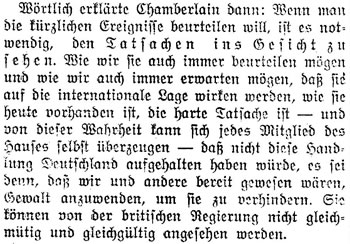
The translation is accurate, but here is the original English text of the relevant passage in Neville Chamberlain's speech to Parliament:
In appraising recent events it is necessary to face facts, however we may judge them, however we may anticipate that they will react upon the international position as it exists to-day. The hard fact is—and of its truth every hon. Member can judge for himself—that nothing could have arrested this action by Germany unless we and others with us had been prepared to use force to prevent it. I imagine that according to the temperament of the individual the events which are in our minds to-day will be the cause of regret, of sorrow, perhaps of indignation. They cannot be regarded by His Majesty's Government with indifference or equanimity.
In hindsight Chamberlain's capitulation in the face of 'facts' that have to be accepted is demeaning but probably realistic: not only did Britain and France not have the military capacity at that moment to defend Austrian independence, but the government of Austria itself was an unpleasant dictatorship that no democratic country would go to war to defend.
Churchill's contribution to the debate is wonderfully perceptive for the modern reader, but founders as much as Chamberlain's did on the impossibilities of a forceful response. Here is a paragraph or two, but the whole is worth reading at the link
The gravity of the event of 11th March cannot be exaggerated. Europe is confronted with a programme of aggression, nicely calculated and timed, unfolding stage by stage, and there is only one choice open, not only to us, but to other countries who are unfortunately concerned—either to submit, like Austria, or else to take effective measures while time remains to ward off the danger and, if it cannot be warded off, to cope with it. Resistance will be hard, yet I am persuaded—and the Prime Minister's speech confirms me—that it is to this conclusion of resistance to overweening encroachment that His Majesty's Government will come, and the House of Commons will certainly sustain them in playing a part, a great part, in the effort to preserve the peace of Europe and, if it cannot be pre-served, to preserve the freedom of the nations of Europe. If we were to delay, if we were to go on waiting upon events for a considerable period of time, how much should we throw away of resources which are now available for our security and for the maintenance of peace? How many friends would be alienated, how many potential allies should we see go, one by one, down the grisly gulf, how many times will bluff succeed, until behind bluff ever gathering forces have accumulated reality?
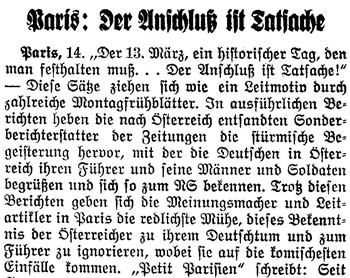
Paris: The Anschluss is a fact
The French foreign correspondents stationed in Austria have all reported the enthusiasm expressed by the Austrian people in their demonstrations.
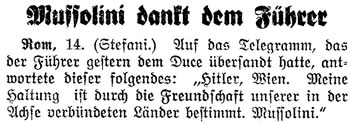
Mussolin thanks the Führer
During the run-up to the Anschluss and the days that followed, Hitler was punctilious in securing the agreement of Mussolini. Italy had historical claims on parts of Austria and it was important not to introduce discord into Italian-German relations. Mussolini's rather cryptic telegram to Hitler is the confirmation that Hitler wanted:
'Hitler, Vienna'. My opinion is determined by the the friendship of our Axis partners.
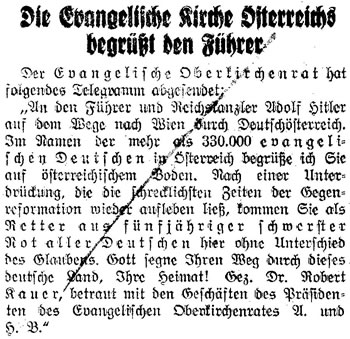
The Evangelical Church of Austria welcomes the Führer
In the name of 330,000 Protestant Germans in Austria I welcome you on Austrian soil. After a represssion, which revived the terrible times of the Counter-Reformation. After five years of the deepest suffering you come as the saviour of all Germans here irrespective of their faith.
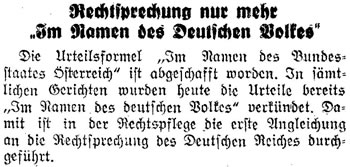
Judicial judgements now only 'In the Name of the German People'
The judgement formula 'In the Name of the Federal State of Austria' has been abolished. … this is the first adaptation in judicial procedures to the procedures of the German Empire.
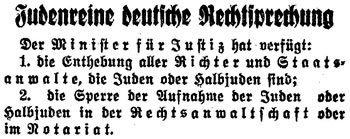
Jew-free judicial process
The Justice Minister has ordered:
1. The removal of all judges and lawyers who are Jews or Half-Jews.
2. The termination of the intake of Jews or Half-Jews as lawyers or notaries.
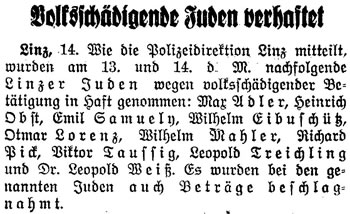
'People damaging' Jews arrested
The Police Directorate in Linz reports that on 13 and 14 March the following Jews in Linz were arrested for 'people-damaging' actions: … Sums of money were also confiscated from these Jews.
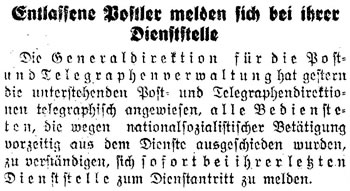
Dismissed postal workers should report to their posts
All postal workers who were dismissed for National Socialist activities should report for service immediately to their former positions.
This report gives us a glimpse into the chaos into which Schuschnigg's government had sunk in their fight against the National Socialists, a fight that ultimately led to the aborted referendum.
Wednesday 16 March


The latest bulwark of the German Nation
The Führer's proclamation on the Heldenplatz
The Wiener Zeiting is the official government newspaper, so its coverage of HItler's speech on Vienna's Heldenplatz, the 'Heroes' Square', on 15 March is hysterically enthusiastic. We've spared you most of the hyperventilation.
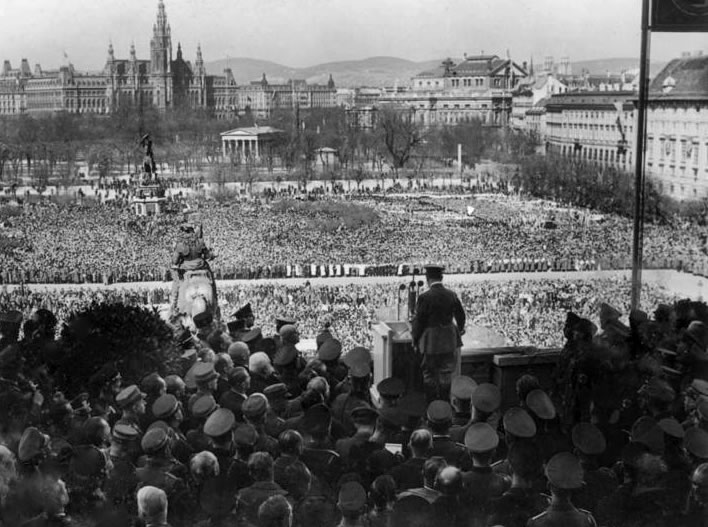
Hitler speaks from the ramp of the Vienna Hofburg to the assembly in the Heldenplatz on 15 March 1938. Image: Bundesarchiv.

The Ostmark has come home
Arthur Seyss-Inquart's grovelling speech at the Heldenplatz demonstration. The name 'Ostmark' came into use in the 19th century as a designation for a tenth century entity that eventually became known as the Archduchy of Austria, one of the core possessions of the Habsburg emperors. The mannered use of the word 'Ostmark' is an attempt at claiming validity through an association with a short-lived medieval term. It also avoids the term 'Austrian Empire', which would usually include many countries, such as Hungary, which are not part of Hitler's acquisition.
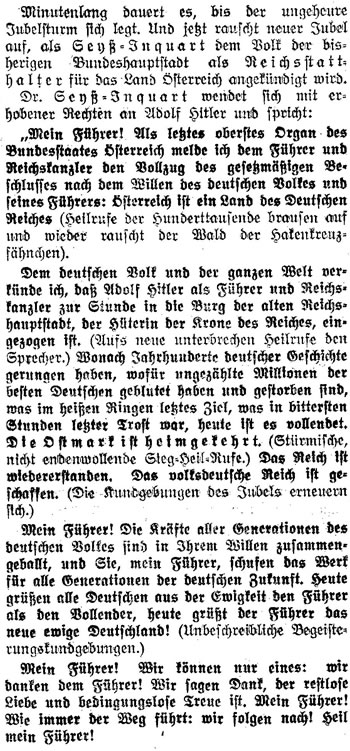
The new Federal Chancellor of Austria, Arthur Seyss-Inquart, now had to welcome Hitler in Vienna. The occasion went to his head and he gave a speech of such cloying servility that it is a model of the subservience of the Austrian National Socialists to their German leaders.
Dr Seyss-Inquart turned to Adolf Hitler with raised right arm and said:
'My Führer! As the last high officer of the Federal State of Austria I report to the Führer and Imperial Chancellor the implementation of the legal decision in accordance with the will of the German people and its Führer: Austria is a province of the German Empire.' (Shouts of 'Heil' from the hundred thousand well up and the forest of swastikas wave wildly.)
'I announce to the German people and the world that Adolf Hitler as Führer and Imperial Chancellor has now entered the fortress of the old Imperial capital, the guardian of the Imperial crown. (More shouts of 'Heil' interrupt the speaker.)'
'Centuries of German history have strived for this, uncounted millions of the best Germans have bled and died for this; what was the last goal of the raging fight, the last hope in the bitterest hours is now fulfilled. The Ostmark has returned home. (stormy shouts of 'Sieg Heil' that did not want to end.) The Empire has risen again. The Empire of the German People has been created. (More jubilation.)'
'My Führer! The power of all the generations of the German people are unified in your will, and you, My Führer, are creating the work for all the generations of the German future. Today, all the Germans from eternity hail the Führer as the 'completer', today the Führer greets the new eternal Germany.' (Indescribable expressions of joy).
'My Führer! We can do only one thing: we thank the Führer! We give thanks, that is the unlimited love and the unconditional faithfulness. My Führer! Wherever the path takes us: we will follow it! Heil, my Führer!'
That path, eight years later, would take Seyss-Inquart to the noose.
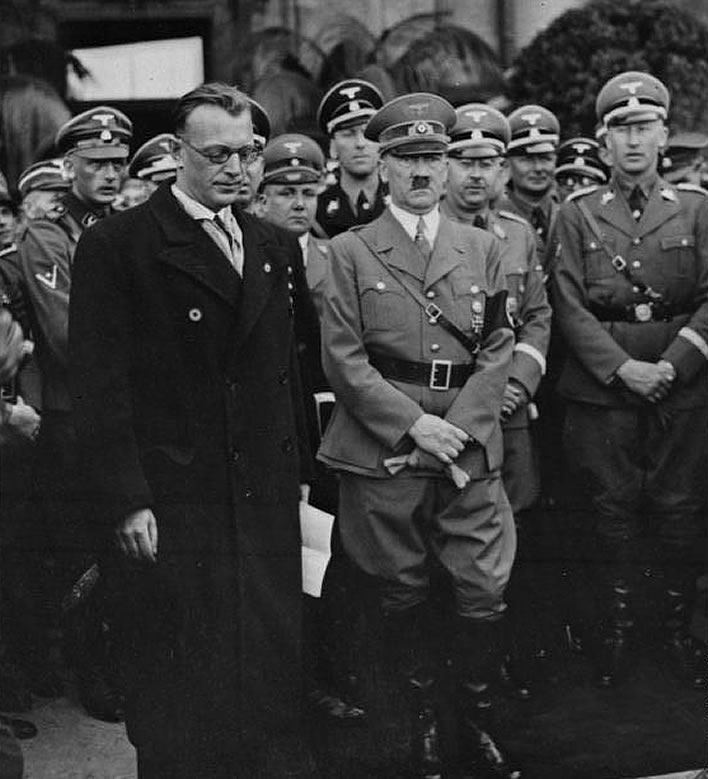
Arthur Seyss-Inquart at the Heldenplatz assembly, speech in hand, with some fine specimens of the German master-race. Left-right from Seyss-Inquart onwards: Martin Bormann, Ernst Kaltenbrunner (Austrian SS), Adolf Hitler, Heinrich Himmler, Reinhard Heydrich. Göring and Göbbels stayed in Berlin to look after the shop. Seyss-Inquart is wearing his NSDAP membership pin on his coat. Image: Bundesarchiv.
Seyss-Inquart had been the useful engine who legitimised the German march into Austria. He was made Federal Chancellor and signed the legal paperwork inviting the takeover. Once this job was done and he had given his speech, his moment in the spotlight was over. Austria had now become just a province of Germany and no longer needed a Federal Chancellor. Almost as soon as his speech was finished he was given a job as administrative head of the Austrian states. He had been Austrian Chancellor for three days.
He then passed through a number of administrative posts in the Reich. He did his job ruthlessly and was responsible for the deaths of many, whether Jews or malcontents. He was condemned at the Nuremberg War Crimes Trial and hanged on 16 October 1946 (on the same day as Ernst Kaltenbrunner).

The wonderful military parade begins

Parade of the German Eighth Army in front of the Führer
Enthusiastic joy at the soldiers of united Germany – An impressive picture of German strength – The day of the army in German Vienna

400 tanks and 500 aircraft
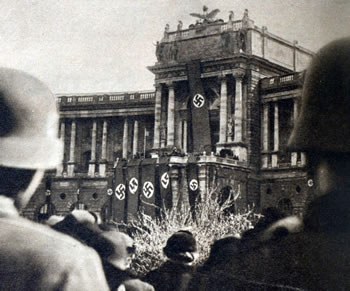
A spectator's view of Hitler giving his Heldenplatz proclamation. There were said to be 200,000 people present.
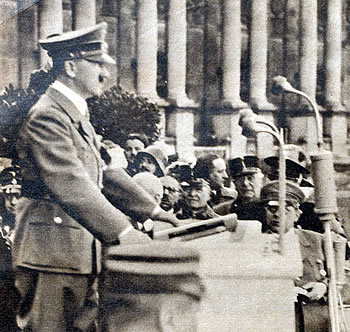
Hitler at the podium of the Heldenplatz in Vienna.
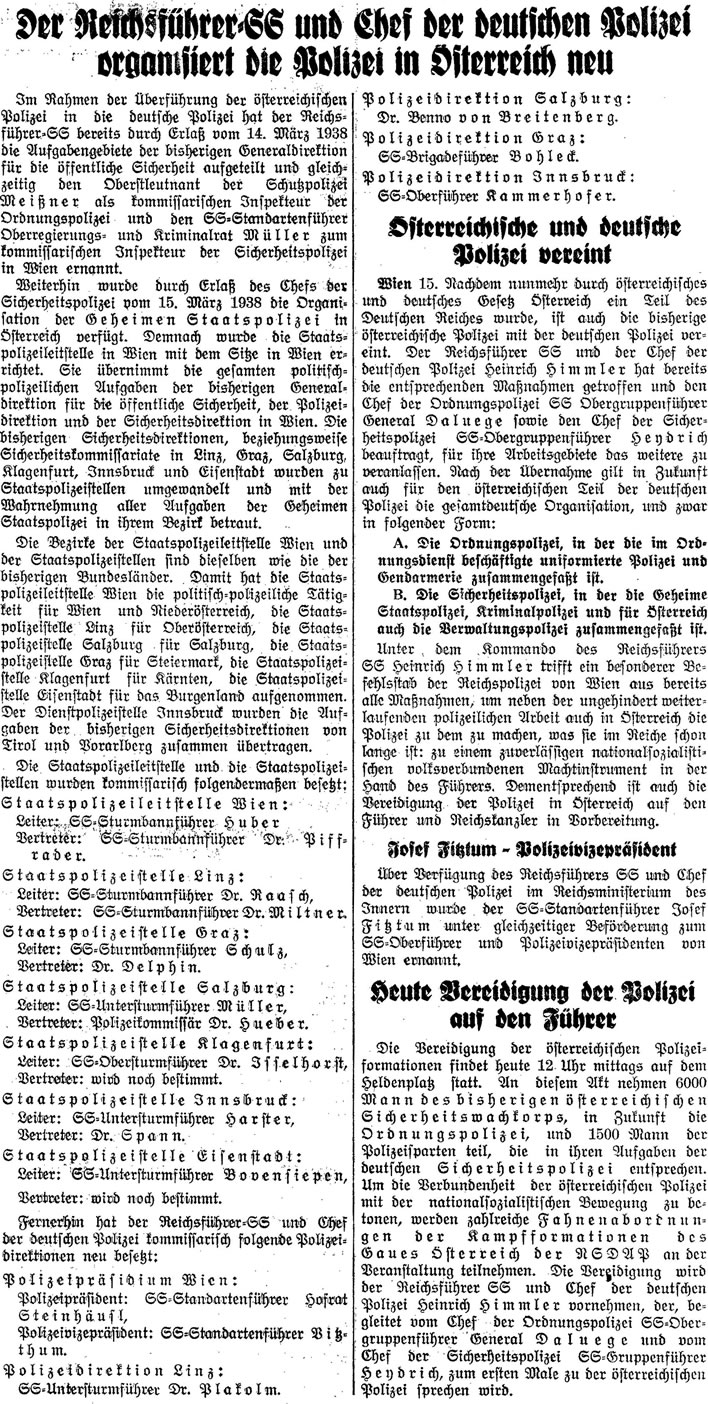
The Reichsführer SS and the Head of the German Police reorganize the police in Austria.
The right people in the right position, the unification of the Austrian and German police and an oath of loyalty to the Führer.
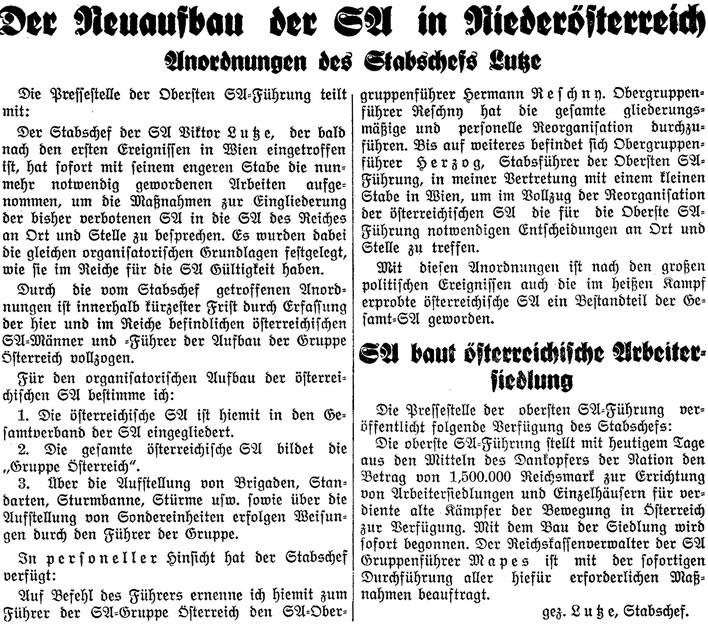
The new structure of the SA in Austria
Directives of Chief of Staff Lutze
The SA, the Sturmabteilung of paramilitary thugs and street-fighters, had played an important part in the establishment of National Socialism in Germany by creating a climate of fear and destabilising the state.
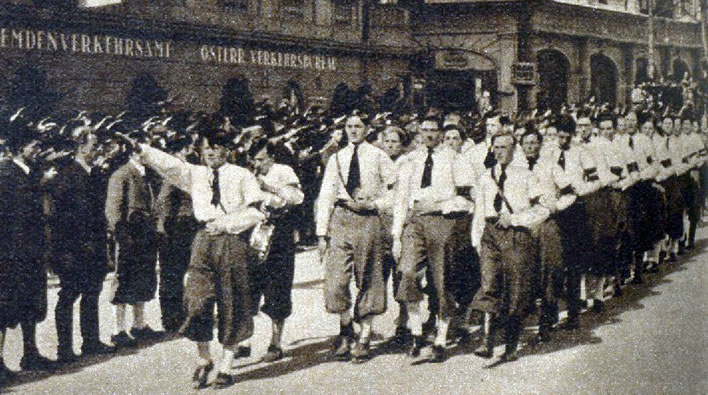
The SA parading in Klagenfurt.
Their role in the Anschluss and in the years before it had been much the same, although they were now much reduced in power compared with the SS.
Thursday 17 March


Are you a German?
Flaming speech by Gauleiter Bürckel – The preparations for the referendum of 10 April
Adolf Hitler flew back to Berlin on 16 March. Josef Bürckel now took the reins in the new German province. One of his main tasks was to organize the referendum that was to take place on 10 April. Nearly 100 percent of Austrians would vote in the referendum and almost 100 percent of them were in favour of the Anschluss.

The Imperial capital in jubilation at the creator of Great Germany
Berlin's most beautiful flag gala – 2½ million people welcome the Führer – Glittering conclusion of a overpowering historical event
Hitler returned to Berlin. Those – not just Germans – who saw him as a strong leader, daring, infallible in his judgements, a leader with destiny on his side, were strengthened immeasurably in their belief by the success of the Anschluss– its suddenness, its organization and its display of overwhelming military and administrative power.

The oath to the Führer
Ceremonial swearing of an oath to the Führer by the Austrian Police
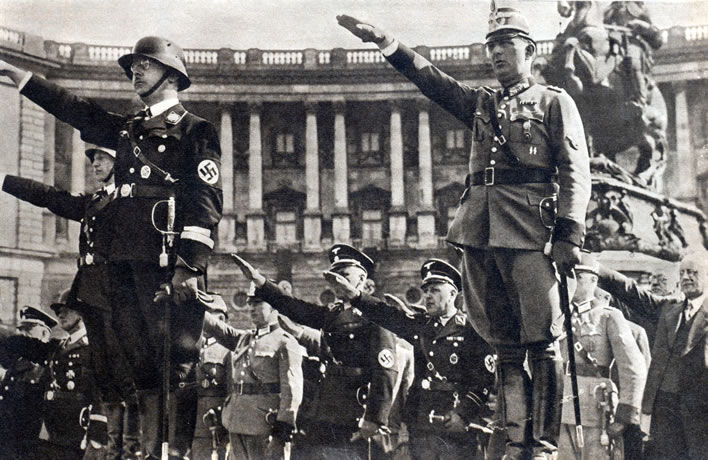
Himmler and other SS lovelies swearing in the (previously Austrian) federal police. From now on, as Bob Dylan would put it in the 1960s, time to 'watch your parking meters'.
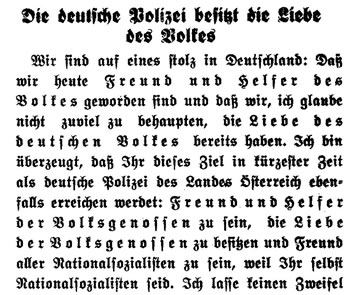
The German police are loved by the people
We are proud of one thing in Germany: that we have become today the friend and helper of the people and that we – I believe I do not exaggerate – are already loved by the German people. I am convinced that you as the German policemen of Austria will also achieve this goal within a short time: to be the friend and helper of the people-comrades, to possess the love of the people-comrades and to be the friend of all National Socialists, because you yourselves are National Socialists.
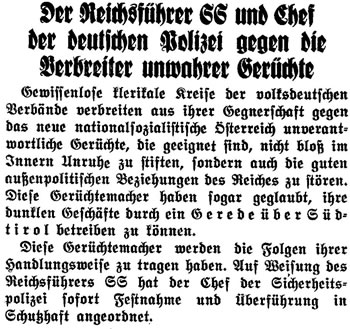
The Reichsführer SS and the Head of the German Police against the spreaders of untrue rumours.
Now the celebrations have finished we are back to business as usual under the Nazi terror. Here is one hint that not everything is perfectly under control.
Clerical circles without any conscience in the German People's associations as a result of their emnity against the new National Socialist Austria are spreading irresponsible rumours that are intended, not just to cause disturbances inside the country but also to disturb the foreign policy relationships of the Empire. These rumour-mongers have even thought that they could spread rumours about South Tyrol.
These rumour-mongers will have to bear the consequences of their actions. On the orders of the Reichsführer SS, the Head of the Security Police has ordered immediate arrest and imprisonment.
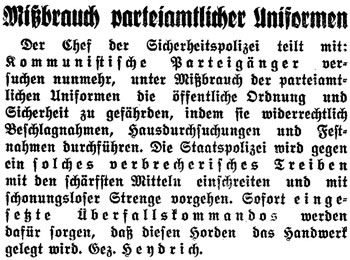
Misuse of official party uniforms
And here is another:
The Head of the Security Police announces: Communists are once more trying, through the misuse of party uniforms, to endanger public order and safety, in that they are carrying out illegal confiscations, house searches and arrests. The State Police will counter this criminal activity with the most severe methods and with pitiless severity. Attack teams have already been set up and will put an end to the work of these hordes.
Signed by Reinhard Heydrich, no less.
With the issue of the Wiener Zeitung for Thursday 17 March we shall end our account of the events of the Anschluss eighty years ago.
Mopping up
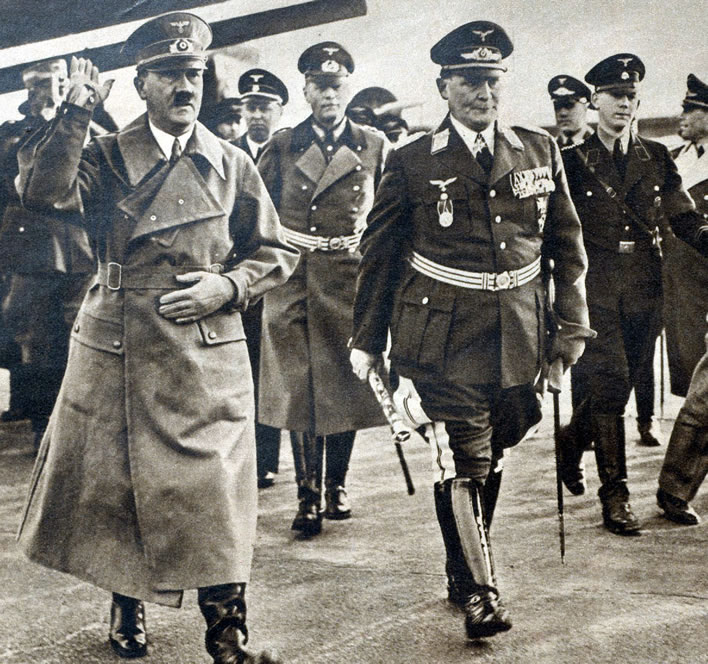
Hitler returns from Vienna by plane to Berlin, where he is met by Göring, inseparable from his marshal's baton and his medal collection.
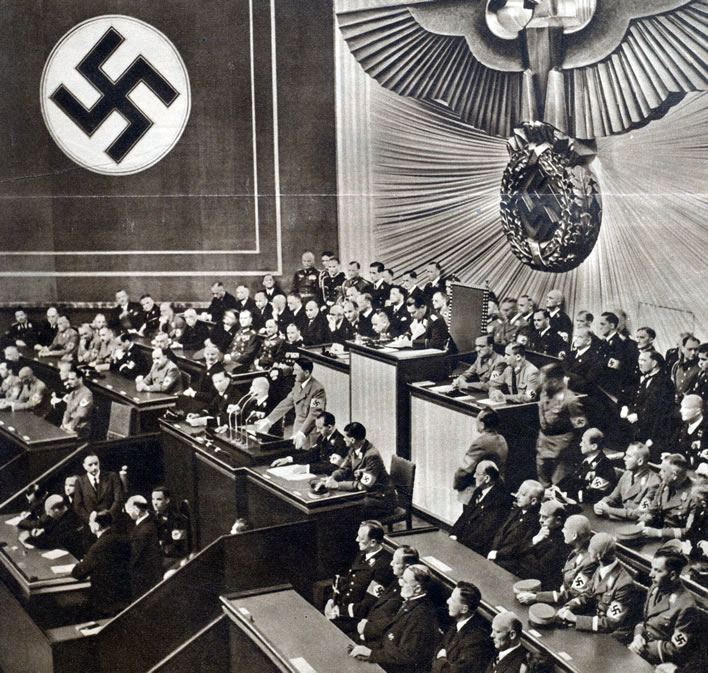
Hitler in the Reichstag in Berlin on 18 March announcing the creation of the Great German Empire.
Gauleiter Bürckel organized Hitler's referendum on 10 April. The voting slip was a little simpler than Schuschnigg's effort had been. Unlike his, at least Bürckel's voting slip offered a 'NO' option:
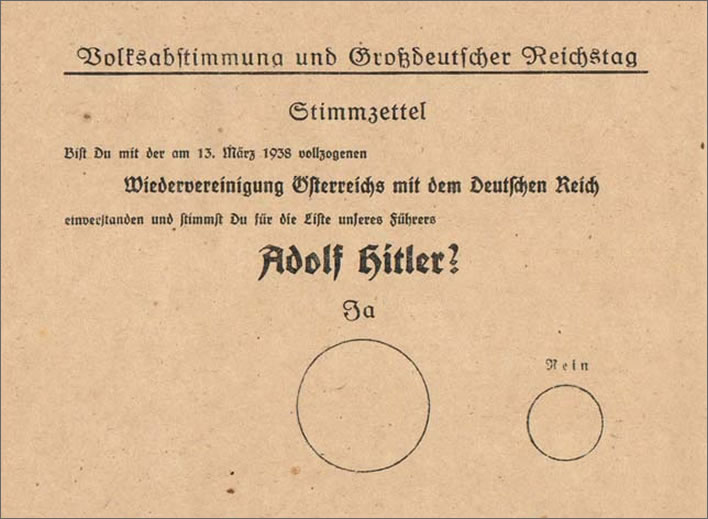
The voting slip for the referendum and parliamentary election on 10 April 1938.
Are you in agreement with the reunification of Austria with the German Empire that took place on 13 March 1938 and do you vote for list [of parliamentary candidates] of our Führer Adolf Hitler? Yes. No.
The Wiener Zeitung helped to make it clear – should there be any doubt – which way the Austrian people were supposed to vote in the referendum:
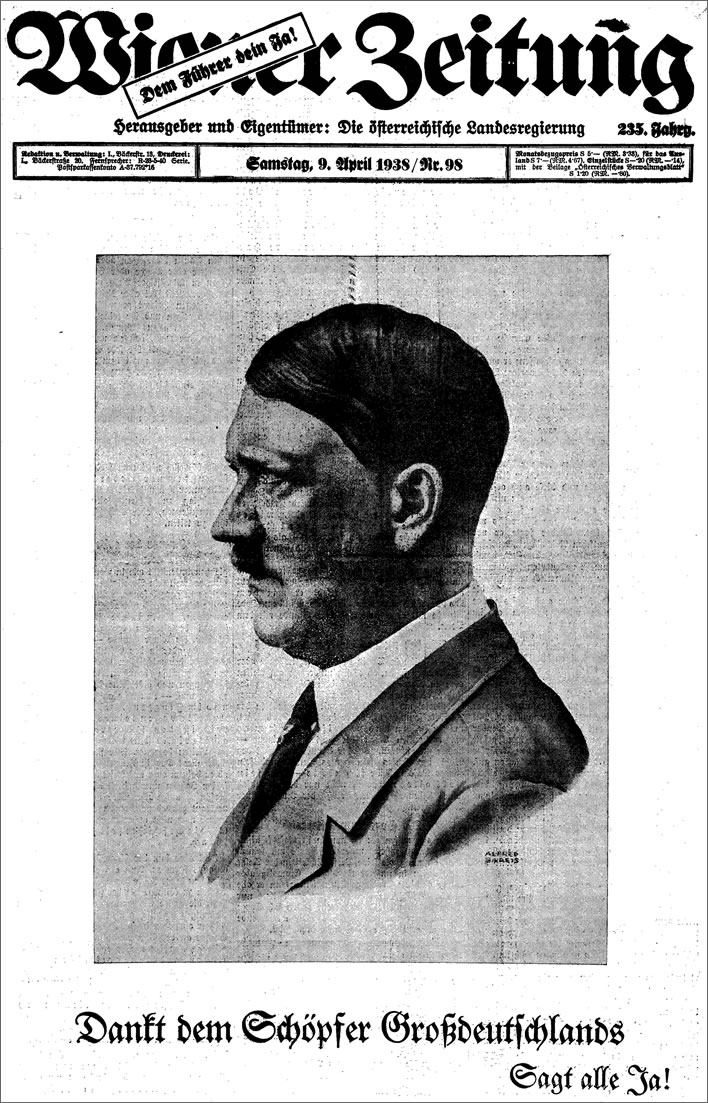
Your YES to the Führer! / Thank the creator of Great Germany / Everyone say YES!
The sharp-eyed will notice that the great double-headed Austria eagle has disappeared from the masthead. The redesigned masthead first appeared in the issue of Tuesday 22 March 1938.
Leaving nothing to chance, in April 1938 Hitler went on a tour of Austria ahead of the referendum on 10 April.
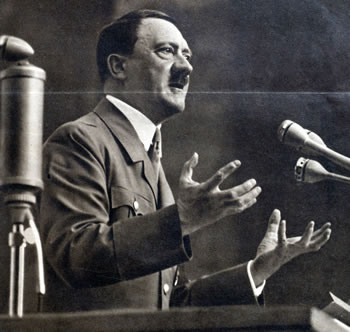
Adolf Hitler working his magic on the crowd in Graz on 3 April 1938 in the run up to his referendum.
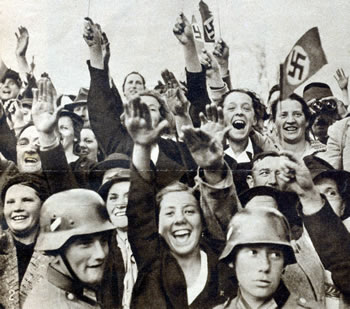
The young ladies of Styria go wild for their new Führer – apparently not faking it, either.
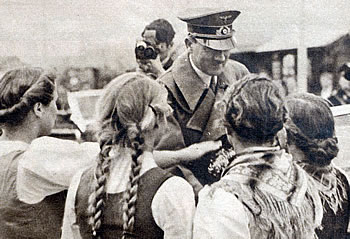
In Linz a group of Austrian girls present their Führer with a bouquet of spring flowers.
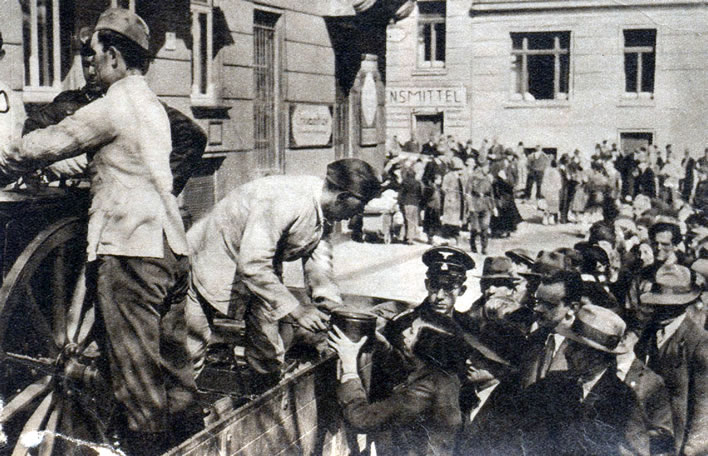
More hearts and minds. Food distribution from National Socialist mobile soup kitchens.
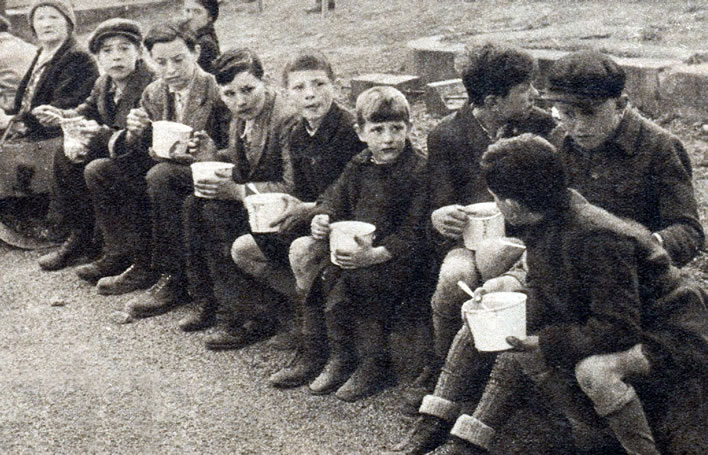
Yet more hearts and minds. The 'battle against poverty and misery'. The National Socialists feed the poor and needy in Vienna.
The government had excluded Jews and any other troublemakers from voting. The result surprised no one:
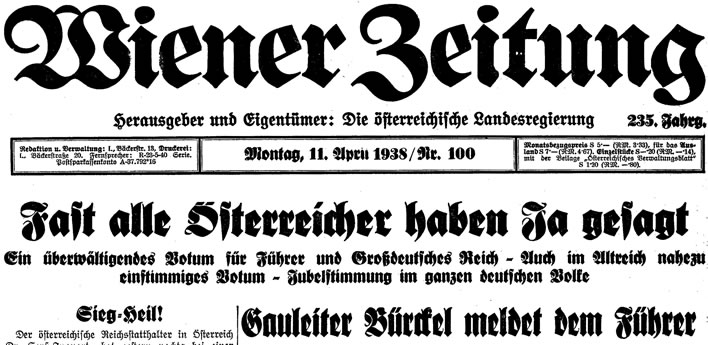
Almost all Austrians have said YES.
An overwhelming vote for the Führer and the Great German Empire – Even in the Altreich an almost unanimous vote – A joyous feeling in the entire German people.
Sieg-Heil!
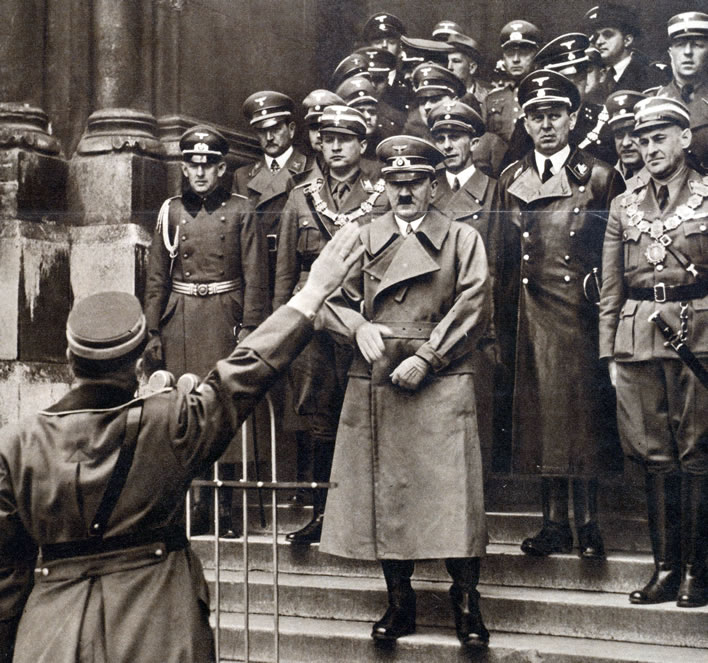
Lovely. Hitler on the steps of the Vienna Council Chamber after the proclamation of the Greater German Empire following the overwhelming vote of the referendum on 10 April 1938.
Austria would suffer more of this, day in and day out, for another seven years until the whole brutal edifice came crashing down and a new Austria arose from the rubble sometime between 27 April and 1 May 1945. Austria, in agreement with its New-Best-Friend-Forever Joseph Stalin, threw over National Socialism and took up a potpourri of other socialisms and communism. It was supervised by the four occupying Allied powers. It finally became an independent state again on 26 October 1955.
Conclusion
We have experienced through the eyes of Austria's government newspaper only a fraction of the happenings in those seven momentous days. Eighty years after the event the historical nuances of the political background to the German takeover of Austria as well as the military aspects of Unternehmen Otto, 'Operation Otto' are still being discussed and argued over. All this analysis is well beyond the scope of this article. Perhaps when we get to the centenary, we might have a crack at that.
Let's close our eightieth anniversary review with Stefan Zweig's magisterial judgement on the events of 1939 in Austria. We think his attribution of so much to one man, Adolf Hitler, is debatable in the light of the huge numbers of people who were more-than-willing accomplices and who brought their own considerable talents to the cause, but the man can write. Not long after writing this, Stefan Zweig and his wife Lotte killed themselves in exile in Brazil. Faced with such overwhelming evil, what else can a strict pacifist do?
I thought that I had already imagined the horrors that would occur when Hitler's hate-dream came true and he triumphantly occupied Vienna, the city that had thrown him out, young and unsuccessful.
But how timid, petty and lamentable my human imagination proved to be compared with the inhumanity that was released on that 13 March 1938, the day on which Austria and thus Europe fell prey to naked force!
The mask slipped. Because the other states had openly shown their fear, no further moral inhibitions were needed. There was no more need to use hypocritical excuses such as the need to liquidate 'Marxists' – who cared anymore what England or France or the world thought?
Now it was not just robbery and theft, but every private revenge had free rein. University professors had to scrub streets with their bare hands; pious, white-bearded Jews were dragged into the synagogue by howling youths and forced to kneel and shout 'Heil Hitler' in chorus; innocent people in the streets were rounded up like rabbits and dragged off to clean the latrines in the SA barracks. Every pathological, filthy, hate-filled fantasy of many orgiastic nights raged in open daylight.
That they broke into homes and tore the earrings from trembling women – something like that may also have occurred in medieval wars. What was new, however, was the shameless lust for public torture, the spiritual martyrdom, the sophisticated humiliations.
All this is recorded not just by one person but by thousands who experienced it. A calmer time, not like our morally weary era, will shudder when they read what one hate-crazed man perpetrated in this City of Culture in the twentieth century.
For this is Hitler's most diabolical triumph among his military and political victories – this one man succeeded by continually greater violations to dull our sense of justice.
Before this 'new order', the murder of a single human without judicial verdict or apparent cause would have shaken the world, torture was considered inconceivable in the twentieth century, expropriations were still called clearly theft and robbery. Now however, after successive Bartholomew Nights, after the daily torturing to death in the cells of the SA and behind barbed wire, what is the value of a single injustice, what value earthly suffering? In 1938, after Austria, our world had become so used to inhumanity, lawlessness and brutality as never before in hundreds of years.
Whilst everything that occurred in this unhappy city of Vienna alone was sufficient for international attention, the conscience of the world in 1938 was silent or simply grumbled a little, before forgetting and forgiving it.
Stefan Zweig (1881-1942), Die Welt von Gestern: Erinnerungen eines Europäers, 1941, Frankfurt am Main: Fischer-Taschenbuch-Verlag, 2010, p. 415f. Translation ©FoS, [link attribution required].
Ich meinte, alles Furchtbare vorausgefühlt zu haben, was geschehen könnte, wenn Hitlers Haßtraum sich erfüllen und er Wien, die Stadt, die ihn als jungen Menschen arm und erfolglos von sich gestoßen, als Triumphator besetzen würde. Aber wie zaghaft, wie klein, wie kläglich erwies sich meine, erwies sich jede menschliche Phantasie gegen die Unmenschlichkeit, die sich entlud an jenem 13. März 1938, dem Tage, da Österreich und damit Europa der nackten Gewalt zur Beute fiel! Jetzt sank die Maske. Da die andern Staaten offen ihre Furcht gezeigt, brauchte sich die Brutalität keinerlei moralische Hemmung mehr aufzuerlegen, sie bediente sich – was galt noch England, was Frankreich, was die Welt? – keiner heuchlerischen Vorwände mehr von 'Marxisten', die politisch ausgeschaltet werden sollten. Jetzt wurde nicht mehr bloß geraubt und gestohlen, sondern jedem privaten Rachegelüst freies Spiel gelassen. Mit nackten Händen mußten Universitätsprofessoren die Straßen reiben, fromme weißbärtige Juden wurden in den Tempel geschleppt und von johlenden Burschen gezwungen, Kniebeugen zu machen und im Chor 'Heil Hitler' zu schreien. Man fing unschuldige Menschen auf der Straße wie Hasen zusammen und schleppte sie, die Abtritte der SA-Kasernen zu fegen; alles, was krankhaft schmutzige Haßphantasie in vielen Nächten sich orgiastisch ersonnen, tobte sich am hellen Tage aus. Daß sie in die Wohnungen einbrachen und zitternden Frauen die Ohrgehänge abrissen – dergleichen mochte sich bei Städteplünderungen vor Hunderten Jahren in mittelalterlichen Kriegen ebenfalls ereignet haben; neu aber war die schamlose Lust des öffentlichen Quälens, die seelischen Marterungen, die raffinierten Erniedrigungen. All dies ist verzeichnet nicht von einem, sondern von Tausenden, die es erlitten, und eine ruhigere, nicht wie unsere moralisch schon ermüdete Zeit wird mit Schaudern einst lesen, was in dieser Stadt der Kultur im zwanzigsten Jahrhundert ein einziger haßwütiger Mensch verbrochen. Denn das ist Hitlers diabolischster Triumph inmitten seiner militärischen und politischen Siege – diesem einen Manne ist es gelungen, durch fortwährende Übersteigerung jeden Rechtsbegriff abzustumpfen. Vor dieser 'Neuen Ordnung' hatte die Ermordung eines einzigen Menschen ohne Gerichtsspruch und äußere Ursache noch eine Welt erschüttert, Folterung galt für undenkbar im zwanzigsten Jahrhundert, Expropriierungen nannte man noch klar Diebstahl und Raub. Jetzt aber, nach den immer erneut sich folgenden Bartholomäusnächten, nach den täglichen Zutodefolterungen in den Zellen der SA und hinter den Stacheldrähten, was galt da noch ein einzelnes Unrecht, was irdisches Leiden? 1938, nach Österreich, war unsere Welt schon so sehr an Inhumanität, an Rechtlosigkeit und Brutalität gewöhnt wie nie zuvor in Hunderten Jahren. Während vordem allein, was in dieser unglückseligen Stadt Wien geschehen, genügt hätte zur internationalen Achtung, schwieg das Weltgewissen im Jahre 1938 oder murrte nur ein wenig, ehe es vergaß und verzieh.
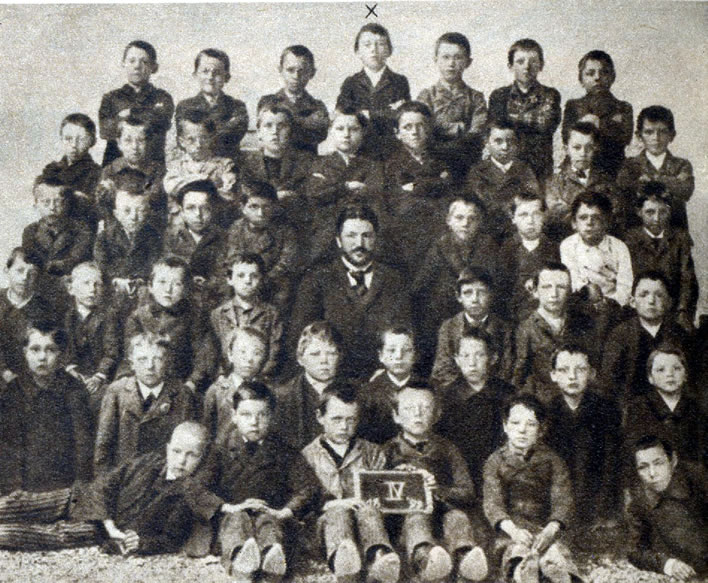
Little Adolf Hitler on the photo of his fourth year class in junior school in Linz in 1899. Just in case you can't spot him from his pose and his position in the group, the 'X' above his head may help. He was around ten years old at the time.
Update 24.03.2018
In order to avoid the widespread constipation caused by the stodgy porridge of this article, some pictorial prunes have been stirred in, taken from the Austrian magazine Das interessante Blatt, 'The interesting paper':
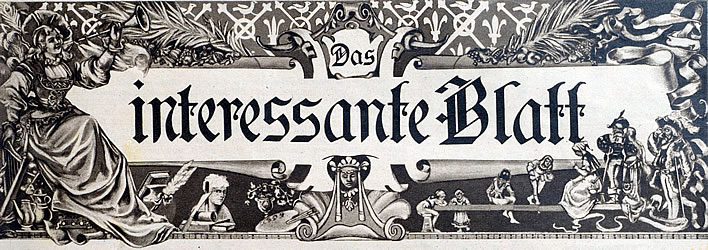
Let's hope it works: no reader should have to endure such agony again.
0 Comments UTC Loaded:
Input rules for comments: No HTML, no images. Comments can be nested to a depth of eight. Surround a long quotation with curly braces: {blockquote}. Well-formed URLs will be rendered as links automatically. Do not click on links unless you are confident that they are safe. You have been warned!